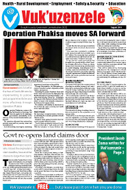Aug 2014
Aug 2014 sadminOperation Phakisa moves SA forward
Operation Phakisa moves SA forward sadminGovernment aims to better the lives of South Africans by implementing its policies and programmes faster and more effectively through Operation Phakisa.
 Operation Phakisa is a version of the Big Fast Results methodology that was first applied by the Malaysian government, successfully, in the delivery of its economic transformation programme.
Operation Phakisa is a version of the Big Fast Results methodology that was first applied by the Malaysian government, successfully, in the delivery of its economic transformation programme.
The operation addressed their national key priority areas such as, poverty, crime and unemployment.
It involves setting clear targets, monitoring progress and reporting on this publicly.
Through this initiative, the Malaysian government was able to achieve impressive results within a short period.
Launching the project, President Zuma said South Africa had renamed the Malaysian Big Fast Results approach Operation Phakisa – a Sesotho word meaning “Hurry Up” - to highlight the urgency with which government wants to deliver on some of the priorities contained in the National Development Plan.
The initiative will initially be introduced in two sectors, the ocean economy and health sector, especially clinics.
First phase
The first phase of implementation will focus on unlocking the economic potential of South Africa’s oceans.
President Zuma said government chose the ocean economy with good reason.
“South Africa is uniquely bordered by the ocean on three sides – east, south and west. With the inclusion of Prince Edward and Marion Islands in the southern ocean, the coastline is approximately 3 924km long,” he noted.
Despite this, the vast ocean space is relatively unexplored when it comes to its economic potential.
“The ocean has a potential to contribute to the Gross Domestic Product (GDP) up to R177 billion. The oceans also has a potential to contribute between eight hundred and one million direct jobs,” President Zuma said.
To tap into the oceans, government has identified four priority sectors, which Operation Phakisa will focus on. These are marine transport and manufacturing activities (such as coastal shipping, trans-shipment, boat building, repair and refurbishment); offshore oil and gas exploration; aquaculture (farming of aquatic organisms such as fish, shellfish and plants); and marine protection services and ocean governance.
Marine transport, manufacturing
Government will explore the country’s natural advantage in maritime transport and manufacturing by capturing the benefits of growing volumes of cargo handling, sea and coastal shipping and supporting transport activities such as storage and warehousing.
The country is also expected to use its location and expertise to increase its share of the global marine manufacturing market, including ship-building and repair, rig repair and refurbishment or boat-building.
Offshore oil, gas exploration
Government is looking at creating a favourable environment for the exploration of oil and gas wells.
This will be done through relevant policies and legislation; promoting inclusive economic growth; addressing the skills gaps and overcoming infrastructure challenges.
Aquaculture
Government also wants to grow the aquaculture sector by increasing the value contribution of all segments across the aquaculture value chain, while creating jobs especially in fish processing and marketing.
Aquaculture is a relatively underdeveloped area in South Africa despite it being an increasingly important contribution to food security globally.
Marine protection services, governance
Government has recognised the need to continuously balance the economic opportunities, which the ocean space affords, with environmental protection.
This will be achieved by developing guidelines for the management of South Africa’s ocean space, improving the protection of South Africa’s oceans, particularly around critically endangered ecosystems, and addressing the skills gap, among others.
Second phase
The second phase of implementation the project will be to pilot the health sector’s Ideal Clinic Initiative to improve service delivery in the country’s clinics nationwide, which will start later in 2014.
The health sector laboratory will be undertaken in partnership with provinces, districts and clinic managers with the aim of producing a detailed plan for improving service delivery in public sector clinics in all provinces. This will include indicators, targets and timeframes as well as a guideline for clinic managers to develop and sustain these improvements.
President Zuma said Operation Phakisa would help move the country forward.
“The people of South Africa deserve much better from all of us. Through Operation Phakisa and all our other key strategic interventions to achieve the goals of the National Development Plan, we must work tirelessly to move our country forward and build a better life for all, especially the poor and the working class,” he said.
Govt re-opens land claims door
Govt re-opens land claims door sadminVictims of land repossession, who missed the original land claim deadline, have another chance to lodge their claims.
This comes after President Jacob Zuma signed the Restitution of Land Rights Amendment Act, which re-opens the restitution claims process that closed at the end of 1998, giving claimants five years - up to 30 June 2019 - to lodge land claims.
Rural Development and Land Reform Minister Gugile Nkwinti said communities and individuals could now claim back land from which they were forcibly removed due to the 1913 Natives Land Act and other racially biased laws.
“The first period for lodgement was opened between 1994 and 1998. Although land claims were made and settled, a great number of people complained that they had not been aware of the process at the time and as such they had missed the initial lodgement window,” the Minister explained.
Given the country’s sad history of land dispossession, Minister Nkwinti said the Restitution of Land Rights programme was a necessary intervention for redress, reconciliation and nation building, which is in line with the National Development Plan (NDP)’s goal of the eliminating poverty and reducing inequality by 2030.
According to the Minister, currently there are about 8 471 claims lodged before the 1998 cut off period that have not yet been settled or resolved.
“These have been prioritised for settlement. I am appealing to those individuals and communities affected to continue to exercise patience while we are resolving their claims and not to lodge their claims again. The outstanding claims will be processed simultaneously with the new ones,” he said.
Minister Nkwinti also issued a stern warning to those who would use the opportunity to rob people of their hard earned money, pretending to help claimants to lodge while charging a fee.
“Lodging a claim is a free government service and anyone who is charging money is doing so illegally. It is also illegal to submit a fraudulent claim, including not disclosing other potential interested parties.
“It is also unlawful for a person to obstruct another from lodging a claim. I am calling on members of society to report their suspicions about any illegal activity in this regard by calling the government anti-fraud hotline number 0800 701 701,” he said.
For more information on the land claim process call the Commission on Restitution of Land Rights on 0800 007 095 or visit www.ruraldevelopment.gov.za
Govt ready to support small businesses
Govt ready to support small businesses sadminSmall businesses and cooperatives can expect more support from government as the Department of Small Business Development gets to work.
 Small businesses have the potential to become the backbone of the economy if they are given the support they need to succeed, said Minister of Small Business Development Lindiwe Zulu during International Cooperative Day.
Small businesses have the potential to become the backbone of the economy if they are given the support they need to succeed, said Minister of Small Business Development Lindiwe Zulu during International Cooperative Day.
She noted that the failure rate for new businesses was around 70 per cent to 80 per cent in the first year and only about half of those that survived remained in business for the next five years.
To reverse this trend, the department would:
- Increase the supply of non-financial support services to cooperatives.
- Create demand for cooperative enterprises products and services.
- Improve the sustainability of cooperatives.
- Increase the supply of financial support services to cooperatives.
- Increase supply for financial and nonfinancial support services.
- Creating demand for small enterprise products and services.
- Reduce regulatory constraints on small enterprises.
She added that according to the National Development Plan, about 90 per cent of jobs would be created through small and expanding companies by 2030.
“The sad reality is that South Africa has one of the lowest rates of entrepreneurship activity in the world. We have a collective responsibility to create a culture of entrepreneurship in our country. We will lead a massive entrepreneurship drive in order to create a nation of entrepreneurs.”
The department would also look carefully at legislation and policies that are creating barriers in the development and growth of small, medium and micro enterprises (SMMEs).
“We will do this in consultation with all stakeholders. We will focus on creating an enabling environment for small businesses to grow and thrive.
“We will work with all our partners to address, among other challenges, the lack of access to markets and procurement, lack of access to finance and credit, low skills levels, lack of access to information,” the Minister said.
Job creation
She added that her department would make it easier and faster to register businesses by ensuring that all services are provided under one roof.
“SMMEs have the potential to be the main driver of economic growth, poverty reduction and job creation. I am informed that in South Africa, small businesses contribute to about 50 per cent of all employment opportunities,” Minister Zulu added.
She said her department would also discuss with the Department of Basic Education how entrepreneurship could be taught at schools.
“People are afraid of venturing into something without security. The culture of having your own business was not installed in South Africans so we would rather work for someone,” she pointed out.
It is only when a person finishes school that they are for the first time faced with the possibility of running their own business, says Minister Zulu.
Entrepreneurship
“They have spent 12 years at school and have not been taught entrepreneurship. For example, there are tuck-shops at schools; it would be a better idea to let pupils at school run the tuck-shop so they can learn practical entrepreneurship skills.”
The Minister said cooperatives were examples of South Africans making things happen for themselves.
“They [cooperatives] are by their very nature about initiative and self-reliance. Many of our successful cooperatives are examples of how much we can achieve if we seize the opportunities brought by our democracy and freedom to create a better life ourselves and fellow citizens,” she added.
The department would also focus on creating an enabling environment for the development and growth of cooperatives.
Minister Zulu said while her department was new, a strong foundation had been laid by the Department of Trade and Industry.
“Some of the work has been done, my job is to look at areas that need improvement and not undo what already works.”
Moving the emancipation of women forward!
Moving the emancipation of women forward! sadmin
After concluding a very eventful Nelson Mandela Month, it is once more my delight to lead our nation in another important month in our national calendar, Women’s Month, in August.
The democratic Government deliberately decided, 20 years ago, to dedicate August to the women of this country, in order to acknowledge their role in bringing about the freedom and democracy we enjoy today.
During August we also reflect on the progress made in our commitment to improve the political and the socioeconomic conditions of women and to renew our efforts at addressing whatever backlogs still hold women back in various areas and sectors.
We commemorate Women’s Month this year under the theme: “Celebrating 60 Years of the Women’s Charter and 20 Years of Democracy: Moving Women’s Agenda Forward”.
The celebration of the 60 years of the Women’s Charter is also within the context of other developments in the continent, such as the African Union’s (AU) Agenda 2063, where AU member states re-affirmed their commitment to promote women’s empowerment and gender equality.
These commitments, outlined in the AU Vision and Solemn Declaration for Africa, can be juxtaposed with the eight aims of the Women’s Charter of 1954 and the Women’s Charter for Effective Equality of 1994 and are envisaged to inform the Post-2015 Development Agenda for Africa and the international community.
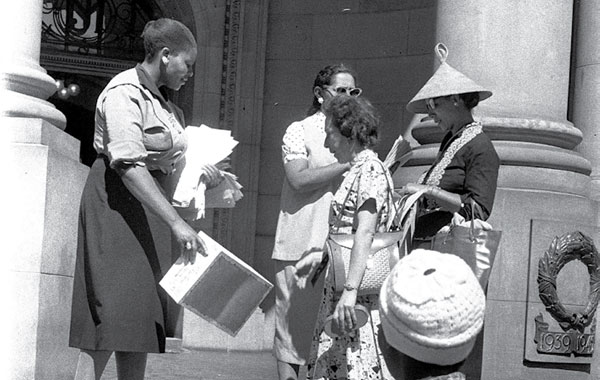 This month we also mark National Women’s Day on 9 August. This day marks the historic 1956 march of 20 000 women to the Union Buildings against pass laws on 9 August. Thousands of women heeded the call to march, led by amongst others, the courageous Lilian Ngoyi, Helen Joseph, Rahima Moosa and Sophie de Bruyn.
This month we also mark National Women’s Day on 9 August. This day marks the historic 1956 march of 20 000 women to the Union Buildings against pass laws on 9 August. Thousands of women heeded the call to march, led by amongst others, the courageous Lilian Ngoyi, Helen Joseph, Rahima Moosa and Sophie de Bruyn.
We salute all these women who fought for freedom and democracy. They are our perpetual source of inspiration as we work together as a nation to take this country forward. In their name we salute many women who gave their lives, their children and their entire families to the struggle. We also salute many women whose daily toil in various trades makes this a better country for all of us.
The celebration of the 60th anniversary of the Women’s Charter reminds us of the commitment made in that document in 1954. Women committed themselves to strive for the removal of “all laws, regulations, conventions and customs that discriminate against us as women, and that deprive us in any way of our inherent right to the advantages, responsibilities and opportunities that society offers to any one section of the population”.
The women further said that “freedom cannot be won for any one section or for the people as a whole as long as we women are kept in bondage.”
As we celebrate 20 Years of Freedom and 60 years of the Charter, we look back at the many milestones that we have achieved as a nation to advance gender equality in our society, thanks to the ANC government and also key organisations such as the ANC Women’s League.
The transformation programme led by the ANC Women’s League has informed the strides made since 1994. Prior to 1994, the South African Parliament had a paltry 2,7 per cent representation of women, while after 1994 they rose to 27,7 per cent, increasing to 30 per cent in 1999 and then to 32,7 per cent in 2004.
After the 2009 national elections, women representation reached 42 per cent, rising to 43 per cent of the Cabinet, while women deputy ministers made up 46 per cent of the total number of deputy ministers. This year, 2014, I appointed 20 men and 15 women as Ministers as well as 20 men and 17 women as deputy ministers. We are moving closer to the 50-50 target.
The quota is another achievement of the ANC Women’s League, gained at the ANC’s 2007 national conference in Polokwane. We congratulate other women’s organisations including non-governmental organisations that continue to advocate for women’s empowerment and development.
Among our country’s institutional achievements in recent times was to mainstream women’s issues from women’s desks in various departments to a fully-fledged department in 2009.
The Department of Women is now based in The Presidency to give focused and exclusive attention to women’s issues. In the same manner, our government also mainstreams and entrenches gender equality and women empowerment across all the departments so as to deepen transformation in society.
We also have Chapter 9 institutions, some of which are headed by women, whose core function is to ensure constitutionally informed and entrenched transformation of society.
The transformation programmes are informed by progressive laws that have been passed in the past 20 years. Examples of these laws include the Employment Equity Act of 1998, the Promotion of Equality and Prevention of Unfair Discrimination Act, 2000 and various other laws in the society that fundamentally reversed the effects of retrogressive laws such as the Black Administration Act 1927.
For the past 20 years, basic delivery of such services as housing, water and electricity has also prioritised the most vulnerable in our society: women, children and the elderly. In the health sector for example, a key intervention has been the provision of free primary health care, and together with the broadened social security net to include 11.7 million children, government has eased the burden off poor women, who struggle to feed their children.
These interventions have also had other spinoffs of fundamental change in the society. For example, there are more girl leaners in schools and tertiary institutions. We continue to work hard to promote safer communities, working with our people to eradicate violence against women and children.
Besides what government is doing, this month is also about celebrating the role of women in every corner of our country. We salute women who raise children alone under difficult conditions. We salute women workers in the factories and the farms who toil as important members of the work force in our country who need to be recognised as such.
August is also the month in which we recommit ourselves to ensuring that women have access to services such as water, electricity, housing, education, health and social assistance to name just a few. We also recommit ourselves to ensuring that women do not have to walk long distances to fetch water or to collect firewood.
We undertake to continue working tirelessly to expand access to these basic services. We will work tirelessly to fulfill these undertakings regardless of how long it takes.
Lastly, true liberation comes through economic freedom, which is why in many government projects we ensure that women’s empowerment is always a key criteria.
Many government departments take this commitment very seriously and have introduced special mechanisms to empower women.
For example, the Department of Trade and Industry has special funding mechanisms for women’s projects while the Departments of Human Settlements and Public Works support and entrench women in the construction industry. Science and Technology promotes women in technology and so do departments in other sectors.
Slowly but surely, we are building a South Africa where women and girls will have a brighter future. Let us all make this month eventful and activity-based, to promote the lives of women as we move South Africa forward.
Malibongwe igama lamakhosikazi.
FAW plant to boost growth, create jobs
FAW plant to boost growth, create jobs sadminThe new First Automobile Works (FAW) South Africa vehicle assembly plant in the Eastern Cape will boost the country’s efforts to achieve growth of 5 per cent by 2019.
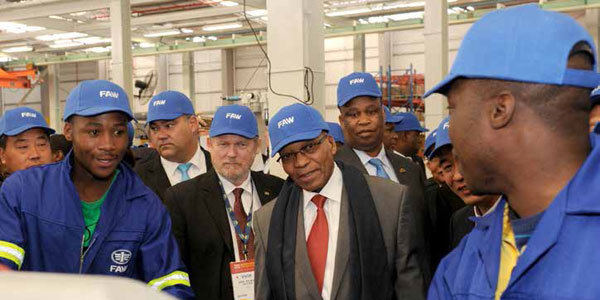 “We have set a growth target of 5 per cent by the year 2019. We view this occasion [the launch of the plant] as a key contribution towards attaining that goal.
“We have set a growth target of 5 per cent by the year 2019. We view this occasion [the launch of the plant] as a key contribution towards attaining that goal.
“Growth is also possible if we, as government, actively support our partners in the private sector to create a positive environment for business to thrive,” said President Jacob Zuma at the launch of the R600-million truck assembly production plant in Port Elizabeth.
Located in Zone 2 of the Coega Industrial Development Zone (IDZ), the production plant is funded jointly by China FAW Group Corporation and the China-Africa Development Fund. It is one of the largest investments in South Africa by a Chinese company.
President Zuma stressed that the economy was a top priority for the new administration.
Economic growth
“We have decided to place the economy on the centre stage because we believe that sustainable economic growth is possible if we seek meaningful partnerships locally and worldwide,” he said.
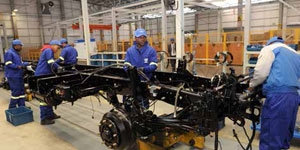 FAW SA has been in the South African market for 20 years, providing passenger and commercial vehicles.
FAW SA has been in the South African market for 20 years, providing passenger and commercial vehicles.
According to President Zuma, the company’s decision to be in the Coega IDZ was a welcome vote of confidence in the Eastern Cape province.
He said the R600-million investment would create much-needed jobs and improve the lives of many people in the area.
“This investment also augurs well for South Africa’s position within the global automotive manufacturing network and proves once again that we have an attractive operating environment to host global multinational companies.”
He was hopeful that the production plant would realise and even surpass its target of producing 5 000 trucks in the first phase, as well as other passenger and light vehicles.
Growing the automotive sector
The President added that government wanted to develop and grow the automotive sector in the country.
“Over the last 20 years, we have employed the Motor Industry Development Programme, and more recently the Automotive Production Development Programme, as the focal industrial policy instruments to transform our automotive industry,” he said.
The aim was to transform the industry from a small assembly base to a globally competitive one, producing vehicles for both domestic and international markets.
The President said government’s intention was to create an environment that would enable the domestic industry to significantly grow production volumes.
The country’s Vision 2020 strategy for the industry refers to the doubling of local vehicle production and broadening and deepening of component manufacture by the year 2020.
Investment
The President also announced that the preparatory work towards establishing an investment support programme for the medium and heavy commercial vehicles sector had been completed.
He said the instrument would help government position South Africa as a destination of choice for the assembly of medium and heavy commercial vehicles.
Investing in Africa
President Zuma added that FAW had chosen the right continent in which to invest in at this point in world economic history.
He said the African continent was home to some of the fastest growing economies in the world and there remained great potential for further growth, particularly in the transport of goods as trade volumes increase.
“The entire African continent is also embarking on an intensive infrastructure development aimed at also encouraging intra- Africa trade through improved connectivity.
“The Regional Economic Communities, namely the Southern African Development Community, Common Market for East and Southern Africa and the East African Community, are in negotiations to achieve a Free Trade Area (FTA).
“The project will bring together 26 countries with a combined population of 600 million and an overall GDP of approximately US $2 trillion (approximately R200 trillion),” the President noted.
The FTA would present significant opportunities and the right climate for doing business.
Sustainable energy
President Zuma said in order to make the country globally competitive, South Africa would have to focus on ensuring a secure supply of energy. The focus over the next five years would be on building a sustainable energy mix that includes coal, solar, wind, nuclear and shale gas.
The President expects to see an increase in inter-country trade and also initiatives to help landlocked countries access harbours.
“Also envisaged is the creation of much needed direct routes between capitals of the continent and to promote the economic and social integration of Africa.
“The increase in trade will contribute towards a growing demand for heavy commercial vehicles, thus expanding markets for FAW and other companies in this sector,” he said.
In line with the National Development Plan (NDP) and the New Growth Path (NGP), government is investing heavily in local and continental infrastructure development in the medium to long term.
Job creation
Trade and Industry Minister Rob Davies said hundreds of jobs would result from FAW operations in the Eastern Cape.
“We are welcoming phase one today, which will see the production of up to 5 000 trucks in this plant, creating 400 jobs. The second phase, which is envisaged to manufacture 30 000 passenger vehicles, can increase jobs to 1 000.
“We know that we can multiply those jobs if and when we start attracting the component manufactures to come here and be part of the programme as well,” he said.
Minister Davies added that the unveiling of the Chinese vehicle manufacturing plant in South Africa was the result of a journey his department took to engage the Eastern Cape Provincial government and the Coega Development Corporation to get a Chinese motor manufacturer to operate in South Africa.
Diplomatic ties
Chinese Ambassador to South Africa, Tian Xuejun, said in the 16 years since the establishment of diplomatic ties between South Africa and China, the relationship between the two countries had developed rapidly.
“We’ve both yielded abundant cooperation outcomes which benefited our people magnificently.
“Chinese companies recognise the development potential of South Africa, value the infrastructure and investment services and lay emphasis on listing the country as one of the top priorities in its expansion of the global market and the African market in particular.”
He said strengthening strategic partnerships with Africa was an established policy of the Chinese government.
FAW South Africa would work hard to ensure economic and social benefit from its operations by integrating with the local communities and performing its social responsibilities.
“I am also convinced that the South African government, especially at the local level of this province, will continue to care and support the follow-up development of this plant, and provide guidance in accordance with laws and regulations necessary to guarantee [this] production and operation,” he added.
Soweto gets a new hospital
Soweto gets a new hospital sadminThe new Zola-Jabulani District Hospital in Soweto was worth the wait says Cynthia Mavundla, who was one of the first patients to get medical care at the new facility.
 Mavundla, of Meadowlands in Soweto, gave birth to her daughter at Chris Hani Baragwanath Hospital and was then referred to the recently opened Zola-Jabulani District Hospital for further treatment.
Mavundla, of Meadowlands in Soweto, gave birth to her daughter at Chris Hani Baragwanath Hospital and was then referred to the recently opened Zola-Jabulani District Hospital for further treatment.
“The hospital is still new and it’s clear that some of the equipment is not yet available but the high standard of care and cleanliness is amazing. The nurses are kind and very professional,” she said.
According to Health Minister Aaron Motsoaledi, the hospital is expected to ease pressure on Chris Hani Baragwanath Hospital, also situated in Soweto.
He pointed out that the country’s population was growing at a rapid rate and this impacted on health care facilities.
“The solution is to build more hospitals, especially in Soweto,” the Minister said.
The Department of Health spent R730 million to construct the new 300-bed hospital over the past eight years.
 Zola-Jabulani District Hospital has a staff compliment of 921 including 26 doctors, 451 nurses and 148 administration staff, among others.
Zola-Jabulani District Hospital has a staff compliment of 921 including 26 doctors, 451 nurses and 148 administration staff, among others.
Minister Motsoaledi said inspectors would visit the hospital to check on issues like infection control, the attitude of staff towards patients, cleanliness and waiting times for patients.
Physiotherapist Busi Nkosi is excited about having proper equipment to put patients on the road to recovery.
“I work with people who have suffered a stroke and are now recovering. We have to teach them how to do things for themselves and use basic household equipment. We have all the equipment and this make our job very easy.”
She was also delighted that the hospital has plans to set up a gym that would further help patients in her section.
Services provided by the hospital include maternity, post natal, gynaecology, obstetrics, radiology and outpatient departments. Pharmaceutical services and an accident and emergency service will also be available.
 The hospital has three theatres for minor operations and has spent R49.7 million on medical equipment and will service the northern and western communities of Soweto from Dobsonville, Emdeni, Meadowlands, Moletsane, Mofolo, Zola and Jabulani, among others.
The hospital has three theatres for minor operations and has spent R49.7 million on medical equipment and will service the northern and western communities of Soweto from Dobsonville, Emdeni, Meadowlands, Moletsane, Mofolo, Zola and Jabulani, among others.
District hospitals like Zola-Jabulani Hospital serve three roles: to provide support to health workers in clinics, provide first level hospital care for the district and be the place of referral from clinics or community health centres. Zola-Jabulani Hospital is one of the many new health facilities built over the past 20 years.
According to the Twenty Year Review released by The Presidency, since 1994 the democratic government introduced a massive infrastructure programme that has resulted in more than 1 500 health facilities being completed.
“This includes building new facilities and revitalisation of existing facilities and facilitated access to health care within a 5km radius of where people live,” it noted.
Technology to keep pregnant women healthy
Technology to keep pregnant women healthy sadminWith a simple SMS the Department of Health will now be able to track the progress of pregnant women thanks to a new initiative called MomConnect.
MomConnect is an SMS system that reminds pregnant women to attend their antenatal and postnatal classes.
The programme is currently being piloted in the Umgungudlovu and eThekwini districts in KwaZulu-Natal and in Hillbrow, Gauteng and is expected to be rolled out to other provinces this month.
“Preparations for the official launch and plans to upscale the roll out of the MomConnect preand post-natal programme for pregnant women and their infants are at an advanced stage. This was following the decision of the National Health Council (NHC) under the chair of Minister of Health Dr Aaron Motsoaledi in March to establish this initiative to improve the quality of care for pregnant women and their infants,” said the department’s director for external communications Nombulelo Leburu.
In addition to sending SMS information and reminder messages, MomConnect helps track mothers and baby’s progress through the Integrated Electronic Patient Record System, which is a medical records system known as Bookwise.
The system makes it possible for healthcare workers to see when a mother or baby has missed a critical check-up, test or immunisation.
The messaging component of MomConnect will have three strands. The first is registration where a pregnant woman, assisted by a health worker at an antenatal clinic will have her particulars, including her cell number, entered into a database. She will then get messages sent to her cellphone regarding the age of the unborn baby and after birth, messages related to immunisation.
The second strand is where any woman who thinks she is pregnant subscribes by phoning a unique number. She will get general pregnancy messages with an additional main message to encourage her to go to an antenatal clinic.
“The third strand is where a community health worker, introduces a woman in the community to MomConnect. This serves as the same purpose as subscription, but more of the woman’s details are entered into the system. The main purpose of both subscription and initiation is to get women to the antenatal clinic as early in their pregnancy as possible,” Leburu explained.
According to the department, only half of all pregnant women report to a clinic or hospital before 20 weeks of their pregnancy, something MomConnect aims to improve.
Ante- and postnatal services are an essential for mother and child health. This reduces the high maternal and child mortality rates in the country. A pregnant woman should be attending antenatal classes at 14 weeks.
MomConnect will be available at clinics where there are antenatal services.
All four major cellphone operators - Cell C, MTN, Vodacom and Telkom - have agreed to a single number that will be used by all operators as well as reverse billing, making the service free to all users.
The messaging will be available in all 11 official languages.
MomConnect will give pregnant women the opportunity to ask questions, register their complaints or compliments about the service they get as well as rate it.
Govt tackles crime
Govt tackles crime sadminBudget votes
Police Minister Nkosinathi Nhleko says government is working towards fighting crime from a different angle, one that takes into account societal issues, which influence the spread of crime.
 Delivering his Budget Vote, the Minister said crime could not be divorced from the extreme poverty that many communities face.
Delivering his Budget Vote, the Minister said crime could not be divorced from the extreme poverty that many communities face.
For government’s approach to work and for the root causes of crime to be dealt with, buy-in would be needed from communities, non-governmental organisations (NGOs), organs of state, business, research and tertiary institutions, he added.
Minister Nhleko said police would continue to focus on reducing the number of serious crimes, cross-border and cyber crime, stabilising public protests and enhancing local police capability.
“We commit the SAPS [South Africa Police Service] to community engagement, listening and being one with the people that we serve. We are also obliged to fight crime and restore the citizens’ faith and trust in our law enforcement agencies and the criminal justice system.”
Professionalising SAPS
The Minister said as part of professionalising the police service, changes would be made to the recruitment strategy of entry level constables to ensure that only the best-suited candidates are hired.
The new recruits are being taken through rigorous testing for suitability before they start formal training.
Minister Nhleko explained that this community- based recruitment strategy is aimed at addressing challenges such as pending and or previous convictions, fraudulent qualifications and to avoid nepotism.
SAPS will also ensure that its current members are taken through rigorous sessions to understand the code of conduct.
“Our approach on professionalising the police service will contribute to the zero-tolerance towards corruption and nepotism, and deliver the calibre of a police official, who will serve the people of this country with dignity and pride.”
Arresting crime
In the past year, police made 1 392 856 crime prevention arrests, which included 818 322 arrests for serious crime and 574 534 for other crimes.
A further 1 218 arrests for serious organised crime, with a resultant 828 convictions, were reported by the Directorate for Priority Crime Investigation, known as the Hawks.
Police managed to secure convictions resulting in 1 110 life sentences imposed on 803 suspects for serious crimes such as murder, rape, business robbery, house robbery and armed robbery.
Government also established 947 Victim Friendly Rooms across all provinces, which were set up to encourage the reporting of cases of a personal nature, including trauma and sexual violence.
Minister Nhleko said the country faced many challenges and called on various sectors to be part of the fight against crime and corruption.
“We would like to engage business around the issues of scrap metal and second hand goods industry, its threat to the economic development of the country and their contribution in the fight against crime and corruption,” said the Minister.
More resources for court services
More resources for court services sadminBudget votes
A large chunk of the Ministry of Justice and Correctional Services’ budget has been allocated to court services.
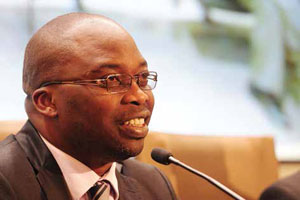 Of the total R17.9 billion budget, R9.3 billion has been allocated to the functioning of the courts.
Of the total R17.9 billion budget, R9.3 billion has been allocated to the functioning of the courts.
Justice and Correctional Services Minister Michael Masutha said the development and improvement of courts was the primary mandate of his department.
“It is for this reason that the bulk of the budget allocated for the Justice and Constitutional Development vote is allocated to the Court Services programme.”
According to the Minister, there are 763 magistrates’ courts (45 of which were built in the past 20 years of democracy) and 13 High Courts countrywide.
He said over the past 20 years, on average, two courts were built a year. Government spends, on average, between R330 million and R350 million towards the construction of a new court.
Minister Masutha noted the construction of the Limpopo and Mpumalanga High Courts were earmarked for completion by 2015 and 2016, respectively.
A further four magistrates’ courts were expected to be completed by the end of 2016/17 financial year and these will be built in Booysens, Mamelodi, Plettenburg Bay and Richards Bay.
According to Minister Masutha, in the past four years, 29 out of 90 Branch Courts were revamped and proclaimed as full services. A further four Branch Courts will be converted into full services in the current financial year.
“We are also accelerating the alignment of magisterial districts with municipal boundaries with a view to ensuring that there is a magistrate’s court in each municipality,” he said.
The Minister added that child maintenance and deceased estates were important service delivery outcomes that his department had prioritised over the years.
“We are pleased that many child maintenance beneficiaries are opting to receive payment through the Electronic Funds Transfer (EFT) and bank system,” he said.
SA puts rural land to work
SA puts rural land to work sadminBudget votes
South Africa’s nine provinces are ready to plant and harvest one million hectares of fallow land in rural areas, says Agriculture, Forestry and Fisheries Minister Senzeni Zokwana.
 Delivering his Budget Vote, Minister Zokwana said for this financial year, the Comprehensive Agricultural Support Programme (CASP), which provides post settlement support to targeted beneficiaries of land reform and other producers who have acquired land through private means, has been allocated R1.8 billion.
Delivering his Budget Vote, Minister Zokwana said for this financial year, the Comprehensive Agricultural Support Programme (CASP), which provides post settlement support to targeted beneficiaries of land reform and other producers who have acquired land through private means, has been allocated R1.8 billion.
The Ilima/Letsema campaign, which aims to distribute agricultural starter packs to poor households has been allocated R460 million, and the Landcare Programme R67.8 million.
“As such, our provinces are geared to plant and harvest one million hectares of fallow land in rural areas, and 70 per cent of the CASP budget has been allocated to implement Fetsa Tlala.
“For this financial year, the department will transfer R1.4 billion through CASP,” he said.
The Minister also announced that all provincial departments of agriculture will be required to present economic development plans, which analyse how best project selection and allocation of all grant funds could lead to local economic development.
He said this was necessary as it would help the department to measure the successes and failures of its projects, as well as the potential impact at an economic level.
“The objectives of provincial strategies will be to embark on radical socio-economic transformation, pushing back the triple challenge of poverty, unemployment and inequality.
“We see our provincial departments as the cold face of our war against poverty and food insecurity,” the Minister explained.
Livestock sector
Minister Zokwana said the livestock sector plays a crucial role in the economy of resourcepoor communities.
About 40 per cent of livestock in South Africa is owned by black smallholder farmers. The Minister vowed to continue to expand the animal improvement schemes to transform the sector.
Landcare Programme
The Landcare Programme is a flagship programme in enhancing the sustainable use of the country’s natural resources.
Minister Zokwana said sustainable management of land, soil, water, and climate systems was critical for sustainable use of our resources and food security.
“A further benefit is the potential to create jobs. The Landcare Programme has been able to rehabilitate 200 000 hectares since 2010 and create 62 000 jobs over the same period.
“We have a total budget of R 67.8 million to rehabilitate 30 000 hectares and create 9 000 jobs for the current financial year,” he said.
The Presidency works towards a better SA
The Presidency works towards a better SA sadminBudget votes
President Jacob Zuma says plans to revitalise the public service are currently being rolled out in all departments.
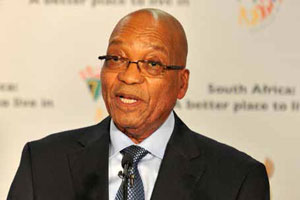 Delivering the Budget Vote for The Presidency, the President said this would achieve a better society, a professional, people-centred, effective, efficient and disciplined public service. “Beyond the major projects and work of departments, we will also monitor the human aspect.
Delivering the Budget Vote for The Presidency, the President said this would achieve a better society, a professional, people-centred, effective, efficient and disciplined public service. “Beyond the major projects and work of departments, we will also monitor the human aspect.
“We will assess the manner in which enquiries and complaints from the public are handled, the courtesy and friendliness of staff and the speed with which members of the public are attended to.
“In this regard, the Batho Pele citizen care programme is being revitalised and will be mainstreamed in every department in order to improve performance and services to the public,” he said.
The President noted that through the Department of Planning, Monitoring and Evaluation, progress in improving the performance of all departments was being monitored.
He added that working groups would be formed to ensure that a clear path to address socio-economic challenges is drafted and established over the next five years.
Among the new working groups being establish are the Presidential Small Business Working Group, the Presidential Working Group on Disability and the Presidential Working Group on Communication and Media.
“We will… establish a Presidential Small Business Working Group, which will bring together organisations representing small business owners and government to chart a path for supporting small enterprises.”
President Zuma said a Working Group on Labour would bring together leaders of major labour federations and government leaders and the community sector to seek joint solutions to the challenges facing all sectors.
Issues that have already been placed before the committee include the national minimum wage proposal and the impact of protracted strikes.
He added that the new Working Group on Disability would enable The Presidency to champion and monitor the work of government departments and society “in creating a better life for persons with disability”.
The launch of a Working Group on Communication and the Media was being finalised, with the aim of bringing together government and organisations from community and commercial media sectors, said President Zuma.
Youth empowerment at heart of rural development
Youth empowerment at heart of rural development sadminBudget votes
Rural Development and Land Reform Minister Gugile Nkwinti says youth empowerment will remain a priority in his department’s economic transformation programme.
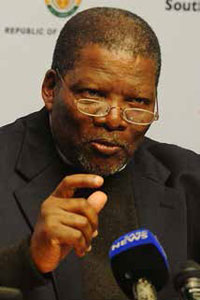 “The department is in the process of establishing a Mega Cooperative for the 14 000-strong National Rural Youth Service Corps (Narysec) participants.
“The department is in the process of establishing a Mega Cooperative for the 14 000-strong National Rural Youth Service Corps (Narysec) participants.
“The envisaged cooperative will be memberowned, with strategic support from the department and other sister departments such as the Departments of Trade and Industry, Agriculture, Forestry and Fisheries, and Small Business Development, the private sector and state-owned entities,” he said.
Minister Nkwinti was speaking during his department’s Budget Vote in Parliament.
Narysec was established in September 2010 to recruit and develop rural youth, so they can perform community service in their own communities. The programme has been hailed as a skills development hub, with 6 000 Narysec participants graduating in a ceremony earlier this year.
Developing women
Women development is also a concern for the department. Recently, it launched the first rural women-owned arts and crafts retail shop and warehouse in Durban.
Minister Nkwinti said this would serve as a market and retail facility for enterprises of rural women in arts and crafts.
Recently, the department met 477 delegates from 93 arts and crafts cooperatives, where a decision was taken to establish a Mega Cooperative.
Focus for 2014/15
The department, through its Rural Enterprises and Industries Development Branch, has prioritised five commodities. These are:
- Grains: maize, wheat, soya beans and dry beans.
- Vegetables, including indigenous vegetables and medicinal plants.
- Livestock: red meat and wool.
- Poultry: caged broilers and free range.
- Arts, crafts and apparel.
Minister Nkwinti said the focus of his department in the 2014/15 financial year will be on communal land tenure, communal property associations, regulation of land holdings, electronic deeds registration and the extension of security of tenure for farm dwellers, tenants and workers.
Deeds registration
Minister Nkwinti said the electronic system the department planned to implement through the Electronic Deeds Registration Bill, would allow it to achieve universal, countrywide access to deeds registration and surveyor-general services.
This will decrease the turnaround time for approval and registration of property.
Increased support for automotive, clothing sectors
Increased support for automotive, clothing sectors sadminBudget votes
The Department of Trade and Industry (dti) is set to increase support for the automotive and clothing sectors, according to Minister Rob Davies.
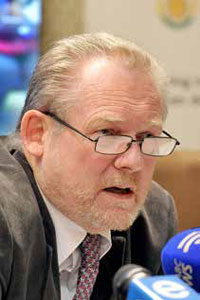 “Firstly, we see acceleration in the automotive sector, where the Automotive Production Development Programme (APDP) has already supported significant new investment in the sector. Projected capital expenditure for 2014 is anticipated to reach a record level of R7.9 billion,” said the Minister during his Budget Vote.
“Firstly, we see acceleration in the automotive sector, where the Automotive Production Development Programme (APDP) has already supported significant new investment in the sector. Projected capital expenditure for 2014 is anticipated to reach a record level of R7.9 billion,” said the Minister during his Budget Vote.
The APDP’s objective is to raise the volume of cars manufactured in South Africa to 1.2 million annually by 2020, as well as diversify the component chain.
In other efforts to grow the sector, the Automotive Supply Chain Competitiveness Initiative (ASCCI) was launched last year to enhance localisation, production and supplier capabilities. Minister Davies said this was proving to be a success, and his department would continue to expand the programme.
The country’s automotive sector employs more than 100 000 people.
“It is an important sector and we will continue to support it,” he said.
Clothing, textile sector
Another important labour absorbing sector for South Africa is that of clothing, textiles, leather and footwear.
The dti has managed to stabilise this sector through improved monitoring of imports to ensure compliance with customs and excise regulations and to reduce unfair and illegal imports.
It has also been stabilised through the designation of the sector under the Preferential Procurement Policy Framework Act (PPPFA) and collaboration with key retailers to encourage local procurement.
The introduction of the Clothing & Textile Competitiveness Programme (CTCP) in 2010 has also helped.
“In the coming year, the department will continue to roll out the CTCP to reach more companies within the sector and I will announce in the near future details of a significant programme to increase value addition in the exotic leather and animal hide industries through the National Exotic Leather Cluster,” Minister Davies said.
Local companies
The dti will continue to play its role in ensuring that government procures 75 per cent of its goods and services from local companies. The dti has already designated goods and services such as power pylons and pharmaceuticals.
The next designation of products for government procurement includes steel and building and construction materials, among others.
Minister Davies encouraged the private sector to buy more from local companies.
More South Africans to get ARVs
More South Africans to get ARVs sadminBudget votes
South Africa is stepping up the fight against HIV and AIDS, ensuring that as many HIV positive citizens as possible are put on antiretroviral (ARV) treatment.
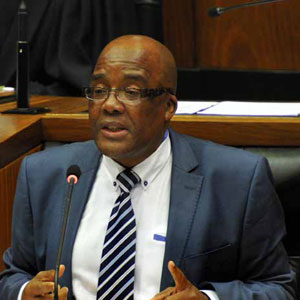 Soon government will make ARVs available to those with a CD4 count of 500 and less, Health Minister Aaron Motsoaledi announced during his Budget Vote.
Soon government will make ARVs available to those with a CD4 count of 500 and less, Health Minister Aaron Motsoaledi announced during his Budget Vote.
“As from January 2015, we shall start HIV positive patients on treatment at the CD4 count of less than 500, as against the present CD4 count of less than 350,” he said.
HIV positive pregnant women will also be put on life long treatment regardless of their CD4 count.
The Minister said all HIV positive pregnant women would be moved to the World Health Organisation’s option B+ as opposed to the current option B, that is operation in the country.
“Option B+ simply means every pregnant HIV positive woman goes on a lifelong treatment regardless of their CD4 status, whereas option B is that they stay on treatment only while breastfeeding, and stop after termination of breastfeeding if their CD4 count is more than 350. Option B+ is lifelong treatment regardless of CD4 status,” he explained.
Minister Motsoaledi noted that the country had come a long way with its HIV and AIDS policies over the years.
In 2009 President Jacob Zuma announced a new HIV and AIDS policy, dictating treatment for HIV positive people with a CD4 count of 350 against the former 200 for special categories of patients.
“In September 2011, then Deputy President Kgalema Motlanthe, expanded this to everybody to make it universal at CD4 count 350. It is a further milestone that we are announcing treatment for all at CD4 count of 500.”
Government will continue to promote a number of prevention methods to help stem the spread of HIV and AIDS.
“Treatment of as many people as possible has been found by research to be also a form of prevention. So this massive treatment programme will also be accompanied by a wide range of prevention techniques including massive condom distribution, HIV Counselling and Testing (HCT), Prevention of Mother To Child Transmission, sexually transmitted infections management, massive medical male circumcision for which we are targeting four million men by 2016,” the Minister said.
Other methods will include information, mass education and communication.
“We also know that keeping girl children at school at least until matric, protects them from pregnancy and HIV/AIDS acquisition,” he added.
The Minister said it was his department’s plan to create a generation of under 20s who were free of HIV and AIDS.
Minister Motsoaledi added that of the 52 million people in South Africa, 35 million were between the ages of 16 and 64 (those considered sexually active). This group need to be prioritised for HCT.
“Our next step is to increase coverage this means testing most if not all of the population annually, initiating everyone who is positive on treatment regardless of CD-4 count and supporting all those that are on treatment.
“It will mean mass testing in every possible setting schools, universities, workplaces, churches and communities,” he said.
Putting municipalities on sound footing
Putting municipalities on sound footing sadminBudget votes
Cooperative Governance and Traditional Affairs Minister Pravin Gordhan has set the bar high for municipalities, saying they must have sound financial management in the next five years.
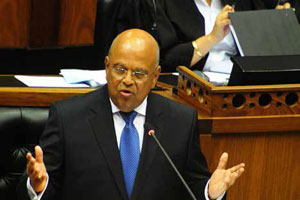 Speaking ahead of his Budget Vote, the Minister said: “Every municipality should have a sound and functional management system with the appropriate level of internal control. Municipalities should also cut wasteful expenditure and focus expenditure on investment infrastructure in performing the service delivery role that they are required to perform.”
Speaking ahead of his Budget Vote, the Minister said: “Every municipality should have a sound and functional management system with the appropriate level of internal control. Municipalities should also cut wasteful expenditure and focus expenditure on investment infrastructure in performing the service delivery role that they are required to perform.”
Every municipality will be asked to deliver a basic basket of services as efficiently and diligently as possible, which will be monitored by both the provincial and national government, he added.
“What we mean by this is that we have to make sure that robots are working, potholes are sealed, water is delivered, refuse is collected, electricity is in supply… and that cutting of grass, which is the core to keeping the environment clean, is being carried out. These basic services must be performed by all 278 municipalities,” Minister Gordhan said.
During the Budget Vote, the Minister reflected on the progress made over the past 20 years. “As we celebrate 20 Years of Freedom, we must recognise the tremendous strides we SAnews have made in eliminating 1 100 racist local structures and creating the foundations of a new system of democratic local government.
“Local government has played a significant role in addressing access to basic services: water, energy, waste, sanitation, transport, and human settlements,” he said.
The aim is to now ensure that every municipality performed their basic responsibilities without compromise, he added.
This included:
A basket of basic services:
- Basic services and maintenance such as cutting grass, patching potholes, working robots and streetlights, consistent refuse removal, must be provided by municipalities.
Governance:
- All municipal council structures must be functional.
- Oversight committees must be in place and perform their responsibilities, without any interference.
- There must be transparency and accountability on the outcomes of these processes.
Administration:
- All municipalities must enforce competence standards for senior managers and appoint persons with the requisite skills, expertise and qualifications.
- All senior managers must sign performance agreements.
- Performance management systems must be applied in accordance with the law.
Sound financial management:
- All municipalities must have a functional financial management system.
- Rigorous internal controls.
- Cut wasteful expenditure.
- Act decisively against fraud and corruption.
Substantive community engagements and participation:
- All councillors must report regularly to their wards.
- Municipalities must have clear engagement platforms with communities.
- Transparent, responsive and accountable processes to communities.
Service delivery:
- Municipalities must develop new infrastructure at a faster pace while adhering to the relevant standards for such infrastructure.
- The department, working with Provincial Departments of Local Government, SALGA and other key institutions will establish compliance monitoring capability and introduce mechanisms for managing consequences for non-compliance and poor performance.
While noting the rights of communities, the Minister also spoke out against protest action that turned violent.
“We cannot tolerate the destruction of property and the violent nature of protests, especially when they assume a criminal character and start impacting on the rights of others, and reversing the state investment in community infrastructure. Citizens and communities have rights and corresponding obligations, and must keep their side of the bargain,” he stressed.
Kusile brings power to the people
Kusile brings power to the people sadminInfrastructure
By 2019, power cuts will be a thing of the past and energy reserves in the country would have increased significantly thanks to the new power station under construction in Mpumalanga.
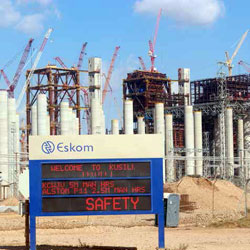 Kusile, the second power station to be built by the democratic government, is expected to open in 2019 and will help take a load off the current electricity grid.
Kusile, the second power station to be built by the democratic government, is expected to open in 2019 and will help take a load off the current electricity grid.
Kusile is an Ndebele and Siswati word meaning “the dawn has come”.
The Kusile project includes a power station precinct, power station buildings, administrative buildings (control buildings and buildings for medical and security purposes), roads and a high-voltage yard, all on a 4 500 hectare site.
The infrastructure will include a coal stockyard, coal and ash conveyors, temporary and permanent water supply pipelines, temporary electricity supply during construction, water and waste water treatment facilities.
The site will also include ash disposal systems, a railway line, limestone offloading facilities, access roads (including haul roads) and dams for water storage, as well as a railway siding and/or a line for the sorbent (limestone) supply.
The station will be the fourth largest coalfired power station in the world.
Kusile Power Station General Manager Abram Masango says when the power station is complete, the country will reach the international standard of having 15 per cent of energy reserves.
Similar to its sister station, Medupi in Limpopo, Kusile will consist of six units each generating approximately 800MW with a combined total capacity 4 800MW (which is enough electricity to light up most of Cape Town).
The first unit will be operational in 2015, while the five units will be commissioned at eight-month intervals, the last of which is expected to be in operation by 2019.
Thousands of jobs have been created thanks to the power station.
Currently, there are 17 000 people on the construction site creating what Masango calls “organised chaos”.
“We’ve got more than 120 companies employing these 17 000 people to construct the portion that they are contracted to do,” he explains.
Most of the workers are locals who form the bulk of the non-skilled and semi-skilled workforce.
“When we started mobilising these contracts we agreed that contractors could bring their core people who would form 40 per cent of the workforce, while the remaining 60 per cent would be employed from the community,” Masango adds.
Serving up success at Kusile
Serving up success at Kusile sadminInfrastructure
About 15 years ago, when Dudu Mahlalela and her three sisters first started their catering business, they occasionally served food at weddings, small parties and funerals in Nkangala, Mpumalanga.
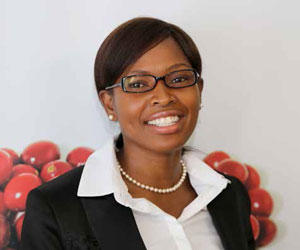 Today, thanks to the construction of the Kusile Power Station in the province, the sisters have a multimillion contract to prepare more than 17 000 meals a day for workers at the power station.
Today, thanks to the construction of the Kusile Power Station in the province, the sisters have a multimillion contract to prepare more than 17 000 meals a day for workers at the power station.
Royal Mnandi Duduza is one of the many companies benefiting from the construction of the new power station in Mpumalanga.
ut the road to a multi-million rand Kusile contract was a difficult one for the sisters. At one stage their business was on the brink of collapse.
In 2009, the sisters were offered an opportunity to prepare and serve 4 000 meals per day in KwaZulu-Natal but the company did not have the staff and experience to manage a project of that size and were not able to deliver on it. The sisters approached Royal Sechaba Food Solutions for a partnership, which gave birth to Royal Mnandi Duduza. Since then the company has grown in leaps and bounds and now employs more than 200 young people from Nkangala.
“Currently our staff is 70 per cent female and 30 per cent male. There are only a few people over 35 years of age,” says Mahlalela.
Royal Mnandi Duduza signed a three-year contract to supply employees with food at the construction site. The contract expired in 2013 and the company has since signed a new contract worth millions of rands.
From struggling to serve 4 000 meals per day to serving about 17 000 meals per day, Mahlalela says the journey to the top had many challenges.
“It has not been an easy journey but I’m very proud of myself. I’ve made so many mistakes over the years and I always tell people that are starting their own business that at this moment no one can match me because of the experience and nothing substitutes experience,” she explains.
Mahlalela says the key is to learn from the setbacks experienced and not repeat those mistakes.
“I’ve made all sorts of mistakes when I was still running my business. From mixing up orders to arriving late at a function, everything you can think of. Those things are in the past and I’ve learned from those mistakes,” she adds.
Mahlalela advice to others who want to get into the catering business is to be patient and work hard.
“You have to start at the bottom, no shortcuts. Starting at the bottom means carrying the chafing dishes, cooking and understanding the basics of a catering business,” she says.
The power plant has also given 24 year olds Tshepo Mavundla and Mnqobi Mazibuko a step up in the business world.
For a long time, the two struggled to get work for their cleaning business despite registering on the databases of a number of companies.
They then teamed up with their mentor Nomsa Mazibuko to form Zitholama Cleaning Services, a youth-owned company.
The construction of Kusile Power Station in their hometown provided just the opportunity the business needed to grow.
Zitholama Cleaning Services successfully applied for a tender, aimed specifically at black youth, to provide cleaning services to the power station.
The company employs 14 locals, including 11 women, who clean offices, collect waste, sweep the pathways, clean toilets and provide general hygiene services to the power station.
According to Nomsa Mazibuko, the company’s income has doubled since it signed the contract with the power station.
“Business is doing well and with the experience we’ve gained at the power station it will continue to grow,” she said.
The journey to getting their big break was filled with challenges, Mavundla explains. “It was tough especially when we were registering on databases of departments and not getting jobs.”
Mnqobi Mazibuko’s says young people who want to start business should be prepared to deal with the challenges that would come with it.
“Never give up on what you want to do and surround yourself with the right people. They say if you want to be a millionaire, hang around millionaires because they will broaden your mind.”
New centre to empower black farmers
New centre to empower black farmers sadminA R60 million multipurpose training and development centre to be built at the Agricultural Research Council (ARC) in Roodeplaat, Pretoria, is expected to give up-and-coming black commercial farmers a boost.
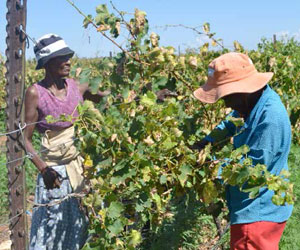 Speaking after the sod-turning ceremony at the centre recently, Rural Development and Land Reform Minister Gugile Nkwinti, said: “With this new multi-million rand facility, our objective will be to rekindle that class of commercial farmers destroyed by the Native Land Act.”
Speaking after the sod-turning ceremony at the centre recently, Rural Development and Land Reform Minister Gugile Nkwinti, said: “With this new multi-million rand facility, our objective will be to rekindle that class of commercial farmers destroyed by the Native Land Act.”
The event coincided with the handing over of certificates to 2 000 graduates who successfully completed a training programme on vegetable and livestock production at the Roodeplaat training facility.
According to Minister Nkwinti, the new facility, which should be built over the next few months, would complement his department’s flagship programme for young South Africans, the National Rural Youth Service Corps (Narysec).
The Narysec was established in September 2010, with its main goal to recruit and develop rural youth to perform community service in their own communities. The Narysec headquarters are in Thaba Nchu in the Free State.
“We are creating a class of black people who are going to run the country’s economy over the next decade. It will actually anchor them because scientific training will be done here.
They will go to Thaba Nchu to implement the theoretical part they have learnt at the new facility. We are looking forward to this facility to sustain our programme of empowering young people,” the Minister said.
He said the biggest challenge facing South Africa was food security.
“We don’t seem to appreciate the challenge because we can go to the market and buy whatever food we want to eat. However, there are many people who cannot afford it. I’m talking about people who go to bed without having a meal.
“We need to produce young farmers who can grow vegetables, produce meat and those who can also look after the environment to ensure that the environment around us can carry us through to the next 100 years.
“Again, if we continue to import food that we can also produce ourselves - then it means we will be exposing ourselves to a serious challenge of food security for the next 50 years. As government, we want to reverse this,” he said.
The multi-purpose training and development centre will be built through a partnership between the department and the ARC.
ARC CEO Dr Shadrack Moephuli explained that the ARC was involved in research and development of new scientific solutions and technologies.
Part of the challenge was finding the best ways to deliver these technologies, information and data to the people who needed to use it.
“We saw it appropriate that we contribute towards the success of agriculture, particularly land reform. We will provide them with the training so that they can be productive themselves, understand the use of technology, how to respond to the needs of consumers, but also how to ensure to identify the diseases at their respective farms and solve the problems on their own.
“We got into this partnership so that we can have a cadre of fairly successful farmers, who will be very productive by themselves,” he said.
Business booming on reclaimed land
Business booming on reclaimed land sadminCatherine Komane may have been just a child at the time but she remembers when she and her community were forcefully removed from their land by the apartheid government.
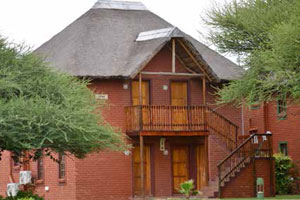 That was in the 1960s and the land in question was Tweerivier, now known as Dikgatlong, in the North West.
That was in the 1960s and the land in question was Tweerivier, now known as Dikgatlong, in the North West.
Today, Catherine is the deputy chairperson of the Dikgatlong Communal Property Association (CPA) and together with her father-in-law Daniel Komane, runs the Dikgatlong Lodge after their land was returned to them by the Department of Rural Development and Land Reform.
With support of the Recapitalisation and Development Programme, the lodge is thriving today, benefiting the community and creating employment.
Daniel recalls that the late former President Nelson Mandela was representing the community and when he was sentenced to jail on Robben Island, the community lost all hope.
“The apartheid government gave us tents for a few months and took them soon afterwards,” he says.
Catherine admits she was doubtful of any form of redress but was equally delighted when the Restitution of the Land Right Act was passed and the Dikgatlong CPA was registered in February 2007. Fifty-two claims were lodged by the direct descendants or original dispossessed black owners of the Tweerivier farm.
Three of the claims were lodged on behalf of the community, while the rest were lodged individually on behalf of families of the original persons dispossessed, according to the department’s documents.
The community, through the department’s restitution programme, was given just more than 5 550 hectares of land to the tune of R96.3 million. They also received grants, amounting to R24.3 million.
Through the department’s intervention, the Dikgatlong CPA received crucial skills training and a further grant to establish an office, which is situated in Brits, explains Catherine.
The CPA then entered into a lease agreement with farmers, who pay rent for operating a neighbouring farm. About 10 people, selected from the community, are employed at the lodge.
Gladys Molekane is one of those who has worked at the lodge for the past three years.
“Life is much better. I wasn’t employed before the community took over the lodge,” she says.
Community members were also employed to paint and provide maintenance at the lodge, Daniel adds.
“Whenever we host events (at the lodge), we employ people from the community. The claim was welcomed. Everyone was excited but the youth want development and hope the claim will alleviate poverty.”
Today the lodge prides itself on the sweet melodies of exotic birds moving freely across the beautiful green trees. The lodge is surrounded by soft green lawn with a clear pool.
There are plans to open four other lodges, which were restored after the land claim and boasts impala and zebra, for wildlife tours, Dikgatlong Lodge manager Samuel Kolokoto reveals.
It is not difficult to understand why the Dikgatlong Lodge was fully booked last December and jam-packed with activities this year.
“From August to January, it’s very busy or fully booked. We have lots of schools visiting, we also host matric dances,” he says.
The department’s project officer for the Dikgatlong land claim, Tsietsi Sebata, congratulated the beneficiaries for the way in which they were running of the lodge.
“I was impressed when I recently visited the lodge. It is truly one of the best. The financial management is good. The community is involved with the finances and the people that work at the lodge are the beneficiaries.”
Sebata indicated that prospective land claimants could learn a lot from the Dikgatlong community when it came to financial management and maintaining a project.
*Lungelo Mkamba works for the Department of Rural Development and Land Reform.
Education a top priority for govt
Education a top priority for govt sadminThe Department of Basic Education wants to see more South African children in school, learning and developing into successful young people who will contribute the country’s growth.
 Delivering her Budget Vote, Basic Education Minister Angie Motshekga said the country had made progress in making quality education available to South Africans.
Delivering her Budget Vote, Basic Education Minister Angie Motshekga said the country had made progress in making quality education available to South Africans.
She also announced that a legislative review to make schooling compulsory for five to 15 year olds was on the cards.
The department’s budget for 2014/2015 stands at R19.6 billion, which is a more than R2 billion increase from last year.
“This once again reaffirms government’s commitment to education,” said the Minister.
In line with the National Development Plan (NDP), which prioritises the need for all children to access at least two years of pre-school education, the department has successfully rolled out the Early Childhood Development (ECD) plan in communities throughout the country.
Noting other successes, Minister Motshekga said 86 per cent of schools have been declared no-fee schools to date and over nine million learners were being fed at schools through the National School Nutrition Programme.
“We will also achieve more than R8 billion in funding for no-fee schools to ensure that no child is left behind because of poverty,” she added.
The department will intensify efforts to make sure that more Grade 12 learners have access to a university education. The goal is to increase the number of Grade 12 learners who enrol at universities from 172 000 in 2013 to 250 000 by 2019.
The mass adult literacy campaign, Kha Ri Gude, will also receive a boost of R634.9 million, with a further R62.3 million allocated towards the Expanded Public Works Programme (EPWP) that will create jobs for teacher volunteers.
Higher Education and Training
In his Budget Vote, Higher Education and Training Minister Blade Nzimande said enrolments at Technical and Vocational Education Training (TVET) colleges, formerly known as Further Education and Training (FET) colleges, has increased by 130 per cent in the past five years.
“We are aggressively paying a particular focus on TVET colleges as the most preferred post schooling option to acquire critical skills that our economy need. We are building more TVET colleges across the country and more money will be directed to elevate their stature and programs offerings. Our top priority is to expand them while improving their quality,” he added.
With a budget of R36.9 billion, the department will spend R2.5 billion on refurbishing two existing TVET campuses and building 12 new campuses in underserved rural areas.
The National Student Financial Aid Scheme (NSFAS), which provides funding to poor students to further their studies, will receive R6.139 billion for 2014/2015.
“This includes R3.914 billion for loans and bursaries to universities, R2.107 billion for bursaries for TVET colleges and R116.2 million for administration. This is supplemented further by R2.416 billion made available through NSFAS recoveries, the National Skills Fund (NSF) scarce skills bursaries, through Sector Education and Training Authorities (SETA) bursaries and from bursaries such as the Department of Basic Education’s Funza Lushaka programme, bringing the total funding available for loans and bursaries for the 2014 academic year to R8.850 billion,” the Minister said.
Massive investment in science graduates
Massive investment in science graduates sadminThe Department of Science and Technology is set to intensify efforts to produce more scientists in the country.
 Minister of Science and Technology Naledi Pandor, has set out the plans for her department for the next five years, which includes investing in more science graduates.
Minister of Science and Technology Naledi Pandor, has set out the plans for her department for the next five years, which includes investing in more science graduates.
Minister Pandor said in its workplace preparation programme, the department provided opportunities for 700 young and unemployed graduates to gain the relevant work experience in science, engineering and technology institutions.
She said in the coming years, the programme would grow to provide support to about 1 000 graduates and postgraduates at an annual cost of R80 million.
The department intends to invest R400 million a year to support postgraduate students.
“We need to massively expand funding in this programme to increase the number of knowledge workers in South Africa. “The DST and its entities will therefore continue to focus on overcoming the challenges facing the South African science, technology and innovation sector, including human capital development and the continuous modernisation of scientific infrastructure such as laboratories and IT equipment, so that we can unlock the potential of science, technology and innovation to contribute to economic growth,” she said.
In her Budget Vote, the Minister said R3.5 billion of her department’s R6.47 billion budget for 2014/2015 will be allocated to research and development.
R1.7 billion will be spent on research grants and bursaries.
“The National Development Plan sets a target of 100 000 PhDs by 2030 to improve research and innovation capacity. In order to reach this target we need train 6 000 PhDs per annum. We now produce just over 1 800 PhDs per year. To train 6 000 a year will cost an additional R5.8 billion a year,” she said.
A PhD is a doctoral degree.
The Minister said her department also wanted to create more female and black researchers.
Currently, 28 per cent of researchers in the country are black and the Minister wants this figure to increase to 40 per cent by 2017.
Females make up 36 per cent of the country’s researchers, a figure the Minister hopes will increase to 50 per cent by 2017.
Govt tackles harmful religious practices
Govt tackles harmful religious practices sadminSchoolchildren who are involved in religious practices that cause harm to others could find themselves behind bars.
This is the warning from the Ministry of Justice and Correctional Services, which launched the Harmful Religious Practices campaign to educate schoolchildren about the dangers of these practices.
According to the department’s Director for Child Justice Dr Charmain Badenhorst, the religious practices in question include vampirism, spiritual intimidation and coercion, voodoo, murder, human sacrifices and mutilation.
There have been recent reports of religious practices in schools or involving schoolchildren that have left a number of young people dead.
Dr Badenhorst said harmful traditional, cultural and religious practices against children were areas of growing fear.
"Parents and communities have expressed grave concern about the behaviour of children, particularly those involved in harmful religious practices including the fact that illegal substances appeared to be a part of the practices. Children expressed fear on the killings and the lack of information on how these practices manifest themselves and what they entail," she said.
Dr Badenhorst explained the right to freedom of belief was entrenched in the Constitution but when such beliefs impacted on the rights of others or caused harm and injury they could lead to prosecution.
"This is what the campaign on 'Harmful Religious Practices' seeks to highlight. We will be visiting schools, explaining what these practices are and that if they endanger someone's life they are illegal. Children could also face prosecution for their involvement in these practices despite their age."
She said the campaign was expected to be rolled out in all nine provinces in partnership with the Departments of Health, Basic Education and Social Development, National Prosecuting Authority, South African Police Service, Religious Leaders Forum and Traditional Leaders and Healers Forum.
According to Badenhorst, parents have the responsibility to monitor their children and identify signs that they might be involved in harmful religious practices.
"Suspicious activity should be reported to social workers, educators, religious practitioners and to the police."
"It is important that children understand that these practices are prosecutable and could result in jail terms. Parents and educators need to educate themselves on the signs so that help can be sourced as quickly as possible," she added.
According to the department, the following are signs to look out that may indicate that a child is involved in harmful religious practices: + A new or odd way of behaving.
- Becomes unusually aggressive, very quiet or secretive.
- Loses concentration or suddenly does poorly at school despite the fact that he or she was once a brilliant learner.
- Talks about being in touch with the devil or about black magic.
- Boasts about having spiritual powers that could cause harm to others.
- Shows fascination with blood, especially human blood.
- Speaks of attempts to cut themselves.
- Speaks of killing or hurting animals or people.
- Shows you strange signs or symbols.
Protecting the best interests of children
Protecting the best interests of children sadminOffice of the Family Advocate
 The Office of the Family Advocate deals with disputes between parents or family members over the parental responsibility and rights of children. The functions of the Family Advocate have been extended by the Children’s Act, 2005 (Act 38 of 2005). This is in line with the Hague Convention which was adopted in 1980 in a bid to curb international abductions of children.
The Office of the Family Advocate deals with disputes between parents or family members over the parental responsibility and rights of children. The functions of the Family Advocate have been extended by the Children’s Act, 2005 (Act 38 of 2005). This is in line with the Hague Convention which was adopted in 1980 in a bid to curb international abductions of children.
What is the Office of the Family Advocate?
A Family Advocate is an unbiased Family Law specialist who assists parties to reach an agreement on disputes regarding parental responsibilities and rights of children through mediation.
You may consult the Office of the Family Advocate if:
- There is a dispute regarding contact, care or guardianship of the child during divorce or separation.
- A person wants to draft a parental rights and responsibilities agreement.
- Parties want to draw up a parenting plan.
- They want to register their parental rights and responsibilities agreements.
- A person wants to amend or terminate parental rights and responsibilities agreements registered with the Family Advocate.
- There is a dispute on whether the unmarried father of the child born out of wedlock has satisfied the requirements which makes him eligible to acquire full parental rights and responsibilities in terms of the Act.
Courts also make orders that the Family Advocate has to conduct an inquiry as to what is in the best interest of the child.
Parental responsibilities and rights
Parents are expected to:
- take care of their child,
- maintain contact with the child,
- act as a guardian to the child
- provide financial support to the child
- provide for the child’s needs.
Parenting plan
A parenting plan includes:
- joint acceptance of responsibilities and rights by both parents
- indicates which parent will live with the child
- the maintenance of the child
- contact between the child and any of the parents or any other person
- the schooling and religious upbringing of the child.
Quick facts
- The Family Advocate cannot become involved in any matter that has already been finalised by the Court.
- The Family Advocate cannot be subpoenaed to Court as a witness to give evidence on behalf of any party even if his/ her recommendation is in favour of that party.
- The recommendation of the Family Advocate is intended to assist the Court in adjudicating a matter and arriving at a particular order. The recommendation itself is not enforceable unless incorporated in a Court Order.
- The Family Advocate is a neutral institution and cannot act as the legal representative for either litigant in a matter.
- The Office of the Chief Advocate deals with 40-50 cases of child abduction annually.
Benefits of consulting with the Family Advocate
 The Family Advocate can amend or terminate parental rights and responsibilities agreements registered by the Family Advocate’s office. This means that the parties do not have to go to court if they want to amend the agreement when the need arises.
The Family Advocate can amend or terminate parental rights and responsibilities agreements registered by the Family Advocate’s office. This means that the parties do not have to go to court if they want to amend the agreement when the need arises.
- In the process of consulting, if the parties reach agreement on disputed issues the matter does not proceed to trial, thereby saving legal costs and time.
- Courts or Judicial officers are required by law to consider the report and/or recommendations of the Family Advocate when making a decision as to what is in the best interest of the minor child.
- Free mediation services
- Parental rights and responsibilities agreements or parenting plans registered with the Family Advocate have the same legal effect as an order of court.
- Courts will not readily give a decree of divorce where there is a dispute regarding minor children without the report or recommendations of the Family Advocate.
Step-by-step guide on solving a dispute
- Upon application by either of the parties or by direction of the court, the Family Advocate will interview the parties in the presence of each other or separately where necessary, to ascertain their personal circumstances and background details in the matter.
- The Office of the Family Advocate also interviews the child with the assistance of the Family Counsellor in order to obtain and convey the child’s views on the matter to court. The aim is to protect the child from testifying in a potentially harsh court environment.
- The Family Advocate helps the parties reach an agreeable or viable solution through mediation by applying their legal expertise and dispute resolution skills in the matter.
- If the parties reach an agreement the Family Advocate will then help them draft a parenting plan or responsibilities and rights agreement which can be registered with the Office of the Family Advocate or made an order of court.
- If the parties cannot reach an agreement, the Family Advocate will then compile a report for court and make a recommendation based on the enquiry that was conducted.
Cost effects
- The Office of the Family Advocate renders his/her services to the public FREE of charge.
- The parties to a legal dispute may be required to pay for additional expert reports, e.g. psychological evaluation, and other forensic tests where those are critical to the determination of the child’s best interests.
| EASTERN CAPE Tel: 043 722 8866/7 EastLondon-FA@justice.gov.za |
FREE STATE Tel: 051 447 1115 Bloemfontein-FA@justice.gov.za |
GAUTENG Tel: 012 323 0760 Pretoria-FA@justice.gov.za |
| KWAZULU-NATAL Tel: 031 310 6500 Durban-FA@justice.gov.za |
LIMPOPO Tel: 015 291 1730 / 015 817 Polokwane-FA@justice.gov.za |
MPUMALANGA Tel: 013 752 2755/ 2762/ 2920 Nelspruit-FA@justice.gov.za |
| NORTHERN CAPE Tel: 053 833 1019/63 Kimberly-FA@justice.gov.za |
NORTH WEST Tel: 018 388 9500 Mafikeng-FA@justice.gov.za |
WESTERN CAPE Tel: 021 426 1216 CapeTown-FA@justice.gov.za |
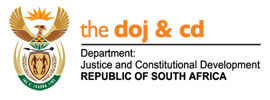 TEL: 012 315 1111 TEL: 012 315 1111PRIVATE BAG X81, PRETORIA, 0001 MOMENTUM CENTRE, 329 PRETORIUS STREET, PTA WWW.JUSTICE.GOV.ZA |
||
Premiers map the way forward
Premiers map the way forward sadminState of the Province Addresses
All nine Premiers recently delivered their State of the Province Address where they spelt out their plans the next five years. Here are some of the highlights...
North West
Marikana in the North West is set to undergo massive developments as the provincial government forges ahead with plans to upgrade mining towns.
North West Premier Supra Mahumapelo said the province would focus on developing the troubled mining area.
“As part of our contribution to development in the mining areas, we have set aside R462 million for housing projects in the Bojanala District in the Rustenburg Municipality, specifically in Marikana,” he said.
The provincial government has also identified land in Marikana for human settlements.
“We have also purchased 400 hectare portions of land from private owners in Marikana at a cost of R47 million purely for human settlements purposes,” he said.
Education infrastructure will also get special attention from the provincial government, the Premier announced.
“We have set aside R292.925 million for the construction of 26 new schools. Over R 75 million of this budget will go towards classrooms additions and renovations of existing schools,” he said.
In an effort to address the challenge of youth unemployment in the province, Premier Mahumapelo said more than 7 000 job opportunities would be created.
Free State
The Free State will focus on providing quality services to those living in the province over the next five years.
Premier Ace Magashule said attention would be given to providing quality water to the citizens in the province. Municipalities would prioritise the cleaning of reservoirs to avoid polluting water sources, deal with the illegal connection of water, as well as step up operations of waste water treatment plants to improve sanitation services and address water supply problems in communities.
Premier Magashule also highlighted the need to improve education.
“Our commitment for the next five years is making early childhood development a priority, eradicating illiteracy and improving the quality of teaching and learning in schools.”
To tackle youth unemployment, the provincial government would continue working with its partners such as Department of Higher Education and Training, various training colleges, Sector Training and Education Authorities (SETAs) and the National Youth Development Agency (NYDA) in the area of skills development and training, the Premier said.
He added that his government would increase the number of participants in the National Rural Youth Service Corps (Narysec) over the next five years and would introduce a programme in all the districts to help 900 youth get their driving licences.
Gauteng
The Gauteng Provincial Government will focus on boosting the province’s economy and creating decent jobs in the coming years.
To create jobs, the province plans to revitalise and mainstream township economies through township enterprises, said Gauteng Premier David Makhura.
The Premier noted that township entrepreneurs were capable of producing many services, such as food for the school nutrition programmes, clothes for school and police uniforms, as well as furniture for government offices.
“This will help us bring millions of township residents into the mainstream of the economy,” he added.
To further boost employment and township economic inclusion, the provincial government and municipalities would now get 75 per cent of all goods and services from local producers, especially Small Medium and Micro Enterprises (SMMEs), township enterprises, women and youth enterprises and those are black-owned, he said.
Also on the cards is the new Tshepo 500 000 programme to be rolled out in March next year. The programme will boost the entrepreneurship skills of 500 000 young women and people with disabilities over the next five years.
The Premier said the province would work with municipalities and state-owned enterprises to ensure public transport infrastructure development and the creation of new integrated and sustainable human settlements and post-apartheid cities that are more connected, liveable, smart and green.
Limpopo
Cooperatives and Small, Medium and Micro Enterprises (SMMEs) are expected to become a vital part of the Limpopo economy.
Premier Stanley Mathabatha highlighted the important role cooperatives and SMMEs would play in the province.
“Cooperatives and SMMEs will form the backbone of our economic interventions in the province. We will ensure that at least 10 per cent of procurement of goods and services by government should be from both the cooperatives and SMMEs,” he said.
The province would also aim to create 426 000 jobs through the Public Works Programme by 2019. Over the next five years the province would facilitate the conversion of under-utilised land in communal areas and land reform projects into productive units. This would also include the revitalisation of irrigation schemes.
The Premier said the province had set its sights high when it came to education.
He was pleased that Grade 12 results had improved from 48.9 per cent in 2009 to over 70 per cent in 2013.
“Our target for this year is no less than 80 per cent.”
Premier Mathabatha said the provincial government had also allocated R145 million to buy and repair equipment for hospitals across the province.
Northern Cape
Supporting cooperatives, youth development and decent housing were high on the list of priorities of Northern Cape Premier Sylvia Lucas.
The Premier said the next five years of her administration would be characterised by implementing government policies.
“We have done the planning. We have drafted the strategies. We have put the structures in place. We are now implementing,” she stressed.
Premier Lucas said her government would use the services of cooperatives and small businesses across the province because they played an important role in its economy.
“The utilisation of cooperatives will be extended to supply identified goods and services to other public institutions, including provincial departments, municipalities, hospitals and Early Childhood Development Centres.”
She said her administration would work hard to create more jobs for young people.
“We will upscale the Environmental Youth Services Programme in the areas of Working with Waste, Working on Wetlands, Working for Water and Working on Fire.”
Residents of Colesberg can also expect to benefit from the provincial government’s human settlements initiatives as a result of R186 million Ouboks Housing Project.
“This project will be implemented in phases which will see 1 848 houses being completed over the contract period comprising five phases,” she added.
Western Cape
One of the key priorities of the Western Cape Government is to make the province a leader in broadband access.
Through a partnership with the State Information Technology Agency (SITA) and Neotel, the provincial government is expected to provide broadband services to 2 000 sites including schools, libraries and health facilities over the next three years, said Premier Helen Zille.
The roll-out of these hotspots was a game changer for development, as it would help reduce the digital divide, make economic opportunities more accessible and generate new business opportunities, she added.
The province was also dedicated to bringing down high unemployment levels through the aquaculture industry, Premier Zille pointed out.
The aquaculture (farming of aquatic organisms such as fish, shellfish and even plants) sector employs about 2 300 people in the province, which is 78 per cent of workers in the industry countrywide.
The provincial government has identified the Doringbaai Abalone Farm as a potential aquaculture hotspot to be the location of a 300 ton production facility.
Two additional suitable sites in Doringbaai have been identified for abalone and salmon farming.
KwaZulu-Natal
Youth development took centre stage in KwaZulu-Natal recently, when Premier Senzo Mchunu delivered his State of the Province Address.
The Premier announced the creation of a Chief Directorate for Youth Development in his office to coordinate youth development projects in the province.
The new chief directorate, known as the KwaZulu-Natal Youth Development Council, is also expected to focus on research on youth development and promote the interests of young people.
The Premier said the province would step up efforts to tackle poverty.
One of the targets highlighted by Premier Mchunu, was that by 2020 the province should reduce the number of households that go hungry in a year from 35 per cent to less than 25 per cent.
He added that attention would be given to small and medium businesses, which are the largest contributors of new employment opportunities.
“We want to increase the number of jobs through the establishment of SMMEs and cooperatives by at least 300 000. We are encouraging our compatriots in the townships and in rural areas to work hard and rekindle their interests in business,” he said.
Eastern Cape
The Eastern Cape Government will invest billions in bulk water projects to ensure clean water for residents of the province.
Eastern Cape Premier Phumulo Masualle said R6 billion would be set aside for bulk water projects.
He also noted that more investment needed to be directed to the rural economy and in sectors with potential to create employment.
The provincial infrastructure programme would be divided into four elements, the Premier noted.
“Firstly, we have prioritised linkages with the mineral producing regions in the country to promote large scale industrialisation in the province. To this end, we are working on an ore rail between the Port of Ngqura and Hotazel in the Northern Cape.”
The second element included positioning the Eastern Cape as the new energy hub of the country.
The third element focused on trade and logistics infrastructure. Investments would continue in all three provincial ports and the maritime sector as a growth industry for the province.
The fourth element focused on infrastructure for rural development with the Mzimvubu Multipurpose Project launched by the President Jacob Zuma in April a key project.
The project involves the construction of two multipurpose dams, Ntabelanga and Laleni, on the Tsitsa River, which is a branch of the Mzimvubu River, to supply irrigated agriculture, domestic and industrial water requirements and hydropower generation.
The Premier said 600 local people had already been employed and work on the site had already begun.
Mpumalanga
Job creation and economic growth will be at the forefront of the Mpumalanga Provincial Government’s agenda for the next five years, according to Premier David Mabuza.
The Premier said the province planned to create 390 000 jobs by 2019, grow the provincial economy by 5 per cent annually and spend about R18.5 billion to support the infrastructure build programme. Premier Mabuza said sectors such as agriculture and forestry, mining, manufacturing, tourism and information communications and technology would receive attention.
Infrastructure that supported development would also be prioritised to fast track service delivery. The strategic infrastructure projects identified by the province include:
- The establishment of an International Convention Centre.
- The establishment of a Cultural Hub.
- An Information and Communication Technology (ICT) Call Centre.
- The establishment of a Fresh Produce Market.
- The establishment of a High Altitude Sports Training Centre.
- The Moloto Rail Corridor Development.
The Premier also highlighted the need to equip the province’s young people. He announced the establishment of a skills development hub in Emalahleni aimed at providing skills for youth who were not in school.
Jobs: Department of Arts and Culture
Jobs: Department of Arts and Culture sadmin Bursaries for Heritage Related Studies: 2015 The Department of Arts and Culture invites applications for bursaries for students who wish to pursue studies in heritage courses. The bursary will finance both undergraduates and post graduates in the following fields:
Bursaries for Heritage Related Studies: 2015 The Department of Arts and Culture invites applications for bursaries for students who wish to pursue studies in heritage courses. The bursary will finance both undergraduates and post graduates in the following fields:
Fields of study
- Archaeology (marine, etc.)
- Archives and records management
- Conservation of the built environment
- Restorative and preventive conservation
- Collections (cultural & natural) management
- Heritage resources management
- Museum management and curatorship
- Courses that contribute to the preservation and promotion of S.A. Living Heritage
Eligibility
- South African citizenship
- Academic potential / satisfactory academic performance (academic progress report if already at an institution)
- Field of study (heritage related)
- Financially needy
- Admission letter or proof of registration at an accredited institution of higher learning
- NB: people with disability are encouraged to apply
Value of the Bursary
- Study fees (incl. registration & tuition)
- Accommodation & meals
- The bursary is renewable if the student meets the requirements for the following year
- NB: Funds are payable directly to the institution of higher learning
Required documents
The following documents must accompany the application:
- Certified copy of birth certificate or ID document
- Certified copy of the salary statement and/or proof of income and affidavit of your parents/ guardians(if not working)
- Certified copy of Grade 12 June examination results / Grade 12 / Matric results
- If already at university – latest results / academic record
- Proof of admission or provisional admission at an institution of higher learning
Application forms can be obtained from the offices of the Department of Arts and Culture, 5TH Floor, 481 Kingsley Centre, Cnr. Stanza Bopape & Steve Biko Streets, Arcadia, Pretoria or online at www.dac.gov.za
Completed application forms together with certified copies of necessary documents should be posted to Heritage Bursaries, Department of Arts and Culture, Private Bag X897, Pretoria, 0001, Or hand delivered to Heritage Bursaries, 481 Kingsley Centre, 5th Floor, Cnr. Stanza Bopape & Steve Biko Street, Arcadia, Pretoria.
For bursary enquiries email: bursary2015@dac.gov.za.
The closing date for submission of applications is 29 August 2014 at 16h30.
No late applications will be considered.
Jobs: Department of Justice & Constitutional Development
Jobs: Department of Justice & Constitutional Development sadmin DEPUTY DIRECTOR: ORGANISATIONAL DEVELOPMENT REFERENCE: 87/14/LMP
DEPUTY DIRECTOR: ORGANISATIONAL DEVELOPMENT REFERENCE: 87/14/LMP
PACKAGE:
R 532 278 - R 627 000 per annum. The successful candidate will be required to sign a performance agreement.
ENQUIRIES: Ms E Kotze
Tel: 015 287 2016
COURT MANAGER REFERENCIE: 113/14/WC
SALARY:
R270 804 per annum The successful candidate will be required to sign a performance agreement)
ENQUIRIES: Mr J Manuel
Tel: 021 462 5471
ASSISTANT DIRECTOR REFERENCE: 14/194/MAS
SALARY:
R270 804 - R318 984 per annum. (Salary will be in accordance with OSD determination). The successful candidate will be required to sign a performance agreement.
ENQUIRIES: Mr Sydney Maeko
Tel: 012 315 1996
ESTATE CONTROLLER EC1 REFERENCE: 14/206/MAS
SALARY:
R141 399 per annum. (Salary will be in accordance with OSD determination). The successful candidate will be required to sign a performance agreement.
ENQUIRIES: Mr Sydney Maeko
Tel: 012 315 1996
IT CO-ORDINATOR REFERENCE: 14/ 72 /FS
SALARY: R270 804 - R327 126 per annum. The Successful candidate will be required to sign a performance agreement.
ENQUIRIES: Ms N Dywili
Tel: 051 407 1800
SENIOR AUDITOR: GENERAL ASSURANCE REFERENCE: 14/205/IA
SALARY:
R270 804 - R318 984 per annum. The successful candidate will be required to sign a performance agreement.
ENQUIRIES: Mr M Motsieloa
Tel: 012 315 1351
OFFICE MANAGER REFERENCE: 14/208/MAS
SALARY: R270 804 - R318 984 per annum. The successful candidate will be required to sign a performance agreement.
ENQUIRIES: Mr S Maeko
Tel: 012 315 1996
ASSISTANT MASTER, MR3- MR5 REFERENCE: 14/209/MAS
SALARY: R183 126 - R662 397 per annum. (Salary will be in accordance with OSD determination). The successful candidate will be required to sign a performance agreement.
ENQUIRIES: Mr. S. Maeko
Tel: 012 315 1996
CLOSING DATE FOR ALL POSTS IS 18 August 2014
NOTE: Interested applicants may visit the following website: www.justice.gov.za or www.dpsa.gov.za to view the full job specification of the above positions. Applications must be submitted on Form Z83, obtainable from any Public Service Department or on the internet at www.gov.za. A Z83 & CV must be accompanied by certified copies of qualifications and identity document. A driver’s license must be attached if indicated as a requirement. A SAQA evaluation report must accompany foreign qualifications. Applications that do not comply with the above mentioned requirements will not be considered.
The Department of Justice is an equal opportunity employer. In the filling of vacant posts the objectives of section 195 (1) (i) of the Constitution of South Africa, 1996 (Act No: 108 of 1996), the Employment Equity imperatives as defined by the Employment Equity Act, 1998 (Act No: 55 of 1998) and relevant Human Resources policies of the Department will be taken into consideration. Shortlisted candidates will be subjected to a personnel vetting process. Correspondence will be limited to short-listed candidates only. If you do not hear from us within 3 months of this advertisement, please accept that your application has been unsuccessful. The department reserves the right not to fill these positions. The department reserves the right not to fill these positions. Women and people with disabilities are encouraged to apply and preference will be given to them.
Jobs: Government Communication and Information System
Jobs: Government Communication and Information System sadminGovernment Communication and Information System (GCIS) seeks an experienced senior manager to be responsible for training and development. The successful candidate will have insight and understanding of government communications and will play a leading role in the training, induction, and development of manual/guidelines/communication policies and implementation of the qualification for government communicators.
 POST : Director: Training and Development
POST : Director: Training and Development
DIRECTORATE: Training and Development
SALARY: All-inclusive salary package: R 819 126 per annum
CENTRE: Pretoria
REF NUMBER: DTD 07/2014
Requirements:
Applicants should be in possession of a three-year Bachelor’s degree in either Communications or Training and Development. A post graduate qualification in either field will be an added advantage.
Experience:
Six to eight years’ experience in a training/communication environment, of which two to three years should be in management.
Job Knowledge:
Expertise in curriculum development and thorough knowledge of communication, demonstrated in-depth knowledge of how the South African Government operates, writing and editing. Have sound knowledge and understanding of government communication / project / financial management, development of policies and procedures, outcomes-based training, and quality assurance, quality frameworks for NQF accredited training, and curriculum development processes.
Competencies required:
Strategic capability and leadership, financial management, programme and project management, service delivery innovation, communication (written and verbal) skills, people management and empowerment, problem solving and analysis, stakeholder management, customer service, Knowledge management and learning and researching.
The successful candidate will report to the Chief Director: Cluster Communication and will be responsible for the following key performance areas:
- Providing managerial leadership and strategic direction, including managing the day-to-day operations of the curriculum development and quality assurance functions in the whole government.
- Confering with departments and conduct surveys to identify training and development needs of government communicator based on the identified needs.
- Creating a framework of policies and procedures for curriculum development and quality assurance, and ensuring implementation thereof and adherence thereto.
- Coordinating the participation of government communication in already established courses provided by accredited learning institutions.
- Monitoring the implementation of developed curricula on an ongoing basis to ensure that it will lead to a credit-bearing qualification for government communicators.
- Analysing, collating and escalating management information for planning and decision-making purposes.
- Evaluating the impact of learning and development interventions to assess whether governments objectives are met.
- Evaluate the effectiveness of the training and development programme, providing recommendation for improvements.
- Develop and organise training manuals, multi-media aids, and other educational and support material for government communicators.
- Managing budgets and ensuring that expenditure is within limits.
- Developing the GCIS’s training policies.
- Managing the performance and development of direct reports in the unit.
- Conducting orientation sessions and arrange on-the-job training for new government communicators, messengers and political principals.
ENQUIRIES: Legadima Leso
TEL: (012) 473 0147
CLOSING DATE:
The GCIS is an equal opportunity employer. Applicants with disabilities are welcome to apply. Applications must be submitted on Form Z83, obtainable from any Public Sevice department and be accompanied by a comprehensive curriculum vitae and certified copies of qualifications and identity document (failure to comply with these requirements, will result in the application being disqualified). Certification stamp must not be older than three months. Suitable candidates will be subjected to a personal suitability check (criminal record, citizenship, credit record checks, qualification verification and employment verification).
Applications should be directed to: The CEO, Government Communication and Information System, Private Bag X745, Pretoria, 0001, for attention: Mr S Matshageng; or hand deliver to: 1035 Tshedimosetso House, Frances Baard Street. Visit our website for more positions in the organisation. Correspondence will be limited to successful candidates only. If you have not been contacted within one month after the closing date of this advertisement, please accept that your application was unsuccessful.
Germany, SA cement ties
Germany, SA cement ties sadminInternational relations
South Africa and Germany have joined forces to boost development, create jobs and grow both economies.
Finance Minister Nhlanhla Nene and German Ambassador Horst Freitag recently signed five agreements worth over R5.89 billion. These agreements are expected to help South Africa create new jobs as well as skill the country’s workforce.
“South Africa is one of our most important global development partners,” Ambassador Freitag said.
He added that Germany would continue to support South Africa as it addressed challenges such as unemployment, crime and developing a skilled and sustainable workforce.
Minister Nene welcomed the German support.
“On behalf of the citizens of South Africa, the recipients of your support, we would like to express our gratitude for the long standing partnership with the German government and hope to strengthen the collaboration going forward,” the Minister said.
South Africa and Germany’s development cooperation dates back to 1992. To date, Germany has invested over R14.4 billion in the country’s financial and technical economy. This amount has gone towards empowering people, transferring of skills and building of institutional capabilities.
Over the last 20 years, the bilateral cooperation has grown into a partnership focused on the areas of energy and climate change, HIV and AIDS prevention and good governance.
“Our development cooperation is an integral part of our broader cooperation in the political, economic, social and cultural spheres, bearing testimony to a successful partnership between countries of the Northern and Southern hemisphere in a changing world,” Ambassador Freitag said.
One of the projects assisted by the agreement is the Violence Prevention through Urban Upgrading (VPUU) programme in Khayelitsha in the Western Cape.
A total of R120 million has been pumped into the programme to be rolled out over the next five years by the City of Cape Town in partnership with the German Federal Ministry for Economic Development and the German Development Bank.
The aim of the programme is to tackle crime, poverty and unemployment by transforming and upgrading communities across the Cape Flats, with Khayelitsha being the first. The project began in 2006.
The programme focuses on reducing crime and increasing safety by upgrading neighbourhoods, improving social standards and introducing sustainable community projects to empower local residents. The project has so far focused on the improvement of four key node areas in Khayelitsha to create safe areas for over 50 000 residents.
Agriculture can open doors for Africa’s youth
Agriculture can open doors for Africa’s youth sadminInternational relations
Young people on the African continent need to appreciate the importance of agriculture in the economy of their countries.
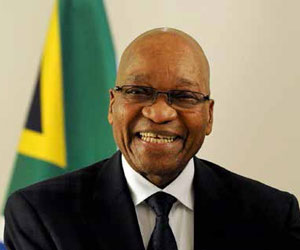 This is according to President Jacob Zuma, who said that agriculture had great potential to unlock sustainable development, food security and job creation in Africa.
This is according to President Jacob Zuma, who said that agriculture had great potential to unlock sustainable development, food security and job creation in Africa.
He was speaking during a working visit to Equatorial Guinea where he led the South African delegation to the 23rd Ordinary Session of the African Union Assembly (AU Summit) under the theme: “2014 Year of Agriculture and Food Security in Africa”.
“An emerging issue identified by the AU leaders was the need for young people to appreciate the importance of agriculture in the economy of their countries,” said President Zuma.
The African leaders also noted with concern that women are still involved in subsistence farming.
“Women must take the lead in agriculture and contribute to this growing economic activity, which is vital for dealing with food security,” he stressed.
The President said the African Heads of State and Government had also discussed peace and security matters, in particular the mobilisation of resources and the operationalisation of the African Capacity for Immediate Response to Crises (ACIRC).
“In order to respond to crises on the continent, the AU Summit took a decision last year to operationalise the African Capacity for Immediate Response to Crises as an interim mechanism, until the African Standby Force is established.”
He added countries that had volunteered to contribute resources to the ACIRC met during the summit. They discussed the state of readiness of the ACIRC.
“It is expected that the ACIRC will be launched by October 2014,” said the President.
The Heads of State and Government at the summit also adopted a number of key decisions to improve the socio-economic and political development of the continent, particularly in the areas of education, health, agriculture, trade, women and youth development.
The Assembly stressed the importance of Technical and Vocational Education and Training (TVET) to Africa’s development, particularly for youth empowerment, employment and entrepreneurship and adopted the 10-year AU Continental TVET Strategy.
It also welcomed the progress in post-conflict reconstruction and development and peace building processes in the Comoros, Côte d'Ivoire and Liberia and expressed its satisfaction at the continued positive development of the situation in Madagascar.
The African leaders shared their outrage at the Boko Haram group kidnapping more than 200 young girls in northern Nigeria and welcomed the on-going AU efforts to address terrorism.
They also adopted declarations related to accelerated agricultural growth and transformation for shared prosperity and improved livelihoods; ending preventable child and maternal deaths in Africa; and nutrition security for inclusive economic growth and sustainable development in Africa.
The 24th Ordinary Session is expected to take place at the AU Headquarters in Addis Ababa, Ethiopia, from 30-31 January 2015 under the theme: “Year of Women’s Empowerment and Development towards Africa’s Agenda 2063”.
Deputy President shares lessons with Sri Lanka
Deputy President shares lessons with Sri Lanka sadminInternational relations
South Africa has lent a helping hand to Sri Lanka by sharing experiences about the Truth and Reconciliation Commission.
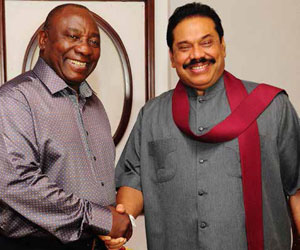 Deputy President Cyril Ramaphosa was in Sri Lanka recently as a Special Envoy of President Jacob Zuma and visited President Mahinda Rajapaksa. South Africa was invited by the Sri Lankan government and the Tamil National Alliance to share the country’s experiences and lessons learnt from the Truth and Reconciliation Commission as an integral part of their negotiated political settlement.
Deputy President Cyril Ramaphosa was in Sri Lanka recently as a Special Envoy of President Jacob Zuma and visited President Mahinda Rajapaksa. South Africa was invited by the Sri Lankan government and the Tamil National Alliance to share the country’s experiences and lessons learnt from the Truth and Reconciliation Commission as an integral part of their negotiated political settlement.
Ahead of the visit, Deputy President Ramaphosa said: “We will discuss with people in the community. We will also try to help the Sri Lankans with the Truth and Reconciliation process, their own constitutional reform and make sure Sri Lanka does indeed become a stable country where they will enjoy human rights.”
Deputy President Ramaphosa met with various political leaders and delegations.
He was accompanied by International Relations and Corporation Deputy Minister Nomaindia Mfeketo, High Commissioner Geoff Doidge, senior government officials, members of the South African civil society.
In February, President Zuma announced that Deputy President Ramaphosa had been appointed as South Africa’s Special Envoy to Sri Lanka and South Sudan. His appointment came at the request of Sri Lanka and South Sudan for assistance in bringing about peace and reconciliation.
“His expertise in conflict resolution and negotiations, as well as our country’s experience in this regard, will greatly assist the two countries to resolve their problems,” said the President during his State of the Nation Address.
SA champions women’s rights
SA champions women’s rights sadminSouth Africa is steadily making gains towards achieving women’s empowerment and gender equality.
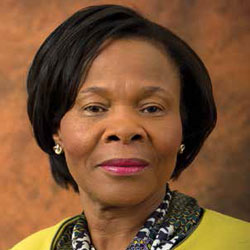 This August, South Africans have reason to celebrate not just Women’s Day but also 20 Years of Freedom and the 60th anniversary of the adoption of the Women’s Charter in 1954 by the Federation of South African Women.
This August, South Africans have reason to celebrate not just Women’s Day but also 20 Years of Freedom and the 60th anniversary of the adoption of the Women’s Charter in 1954 by the Federation of South African Women.
Each year South Africa observes Women’s Day on 9 August, remembering the 20 000 women who fought for freedom and marched to the Union Buildings in 1956 in protest against the legislation that required black South Africans to carry their identification pass. President Jacob Zuma paid tribute to the women who helped shape democracy when he addressed the Women’s Day event in KwaZulu-Natal.
The theme for Women’s Month is “Celebrating 60th Anniversary of Women’s Charter and 20 Years of Freedom: Moving Women’s Agenda Forward!” The Women’s Charter outlined the aspirations of women for national liberation, emancipation – including political participation of and equality for women. The Women’s Charter for Effective Equality was launched on Women’s Day in 1995. These two charters provided a platform that called for respect, human dignity and rights for women.
Leading this year’s Women’s Month campaign is Minister of Women in The Presidency Susan Shabangu.
The Minister urged all South Africans to work with government to address the challenges that women face.
She said that despite the many strides women have made over the past 20 years, social and economic ills still plagued many of them.
“We still have women who are very dependent on social grants as their only source of income; women who struggle to get maintenance for their children; women who are beaten by their partners; black women who suffer oppression under customary law; women who are raped and some even killed. We need to turn this around and fast,” said the Minister.
To help the Ministry achieve this, Minister Shabangu said for the next five years her focus would be ensuring that women are major players in the economy and benefit from initiatives of both the public and private sectors. One of the major issues that affect women is unemployment.
“We are working towards ensuring that women are properly skilled, trained and developed for the workforce. Once a woman is equipped with the right tools, she is able to transform her life,” she pointed out.
The Ministry will also work with other departments such as those of Social Development, Justice and Correctional Services, Basic Education and Higher Education and Training to roll out several community outreach education and awareness programmes highlighting women’s empowerment and tackling violence against women.
“The central message we want to highlight as we move South African women forward is nothing about women without women. We need to move women from the status of victims to victors by ensuring that they are not left behind.”
The Minister added that many women were trapped in abusive relationships because they had nowhere to go and no skills to find work.
“This is why we are working on various programmes tackling skills development to be rolled out soon. We want to see women in society being able to break the glass ceiling. A woman must empower herself, stand up for herself, she must not accept abuse, she must not accept being inferior, she must know her worth and she must have the tools to change her life.”
She called on South Africans to celebrate and honour the women who sacrificed their lives to make sure that women in the country now have the opportunities they did not enjoy many years ago.
Transforming SA sport
Transforming SA sport sadminSports
Government wants sport and recreation to contribute towards transforming South Africa into a democratic country that truly reflects the diversity of its people in all sporting codes.
 Sport and Recreation Minister Fikile Mbalula said South Africa’s sport associations would now be benchmarked according to transformation priorities and those failed to comply would not receive government grants.
Sport and Recreation Minister Fikile Mbalula said South Africa’s sport associations would now be benchmarked according to transformation priorities and those failed to comply would not receive government grants.
“We will support you as we’ve been doing; however, if you choose to neglect or undermine transformation, we will withdraw our support. This is not a threat but stern warning to any unmanageable individuals and sport bodies.
“Federations that do not invest in development structures will not receive funding from Sport and Recreation until they play ball and put their houses in order,” he said.
Minister Mbalula’s warning came after he received the transformation status report recently from the Eminent Persons Group (EPG) on transformation in sport.
 The EPG was appointed to help the Minister monitor and evaluate the current transformation process in sport, as outlined in the National Sport and Recreation Plan (NSRP).
The EPG was appointed to help the Minister monitor and evaluate the current transformation process in sport, as outlined in the National Sport and Recreation Plan (NSRP).
According to the Minister, 10 per cent of the funding for sport association would be guaranteed part of the grant to be used for administration, while 90 per cent would be the conditional grant part and its spending would be measured according to the implementation of the transformation charter.
Minister Mbalula added that his department would withdraw the national colours and symbols and deregister federations that did not implement the scorecard or undermined transformation.
“We will oversee the establishment of provincial and local transformation committees as recommended in the report,” he said.
 The EPG would interact with sports bodies who need help to reach transformation targets, the Minister added.
The EPG would interact with sports bodies who need help to reach transformation targets, the Minister added.
The NSRP was adopted at the National Sport and Recreation Indaba held in 2011 in Midrand and identified transformation as an important issue that was nonnegotiable.
The NSRP also defines transformation as a strategic objective to ensure that equal opportunities exist for all South Africans to participate and excel in sport and recreation through the adoption of deliberate transformation initiatives.
A pilot Transformation Status Survey was conducted by the EPG chaired by Dr Somadoda Fikeni towards the end of 2013 and completed in 2014.
According to the report, transformation efforts in sport have proven to be mostly ineffectual over the past 20 years.
Despite this, Minister Mbalula said the sport industry also has a good story to tell 20 years into democracy.
“I believe South Africans still remember how the ability of sport helped us to unite the nation through hosting major sporting events such as the 1995 Rugby World Cup, 1996 Afcon, 2009 Confederations Cup, the 2010 FIFA World Cup, the 2013 Afcon and the 2014 CHAN tournaments,” he said.
Sport facility brings joy to Gugulethu kids
Sport facility brings joy to Gugulethu kids sadminSports
Future sport stars from Gugulethu in the Western Cape now have the opportunity to perfect their skills after a new multi-purpose sport court was opened in the area.
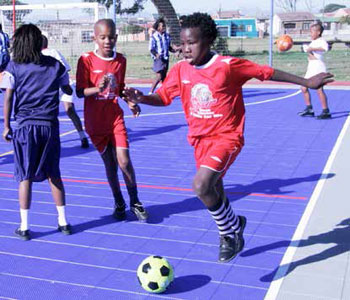 Built by Sport and Recreation South Africa (SRSA) in partnership with the Sports Trust and the Western Cape Departments of Cultural Affairs and Sport (DCAS) and Education, the sport court was recently unveiled at the Nobantu Primary School.
Built by Sport and Recreation South Africa (SRSA) in partnership with the Sports Trust and the Western Cape Departments of Cultural Affairs and Sport (DCAS) and Education, the sport court was recently unveiled at the Nobantu Primary School.
The Sports Trust is a joint venture between the private and public sector aimed at providing opportunities for all South Africans to play sport at all levels, across the sporting codes.
Costing R1 million, the new sport court in Gugulethu has a 20-year lifespan.
According to DCAS, the court floor and facilities were specially designed to cushion players, making playing sport safer particularly for young learners, while the courts are also environmentally friendly.
Schoolchildren from Nobantu Primary and neighbouring schools are using the sport court playing soccer, netball, basketball, tennis and volleyball there.
Nobantu Primary School principal Linda Appolis hopes that the new sports facility will be a base for future sport achievers and leaders in Gugulethu.
“We will be sharing the court so that other schools in the area and local sport clubs can benefit from this amazing new gem in Gugulethu,” said Appolis.
Soccer fanatic Siphosethu Mzwathali, 13, was overjoyed with the new facility, where he spends all his free time improving his soccer skills.
“My friends and I can now take our sport to another level, and we can be great soccer stars one day,” he said.
According to Anita Matthews of the Sports Trust, the new facility is expected to boost education through sport.
“This court will be an integrated hub where the whole community can take pride in participating in the joy of sport.”
The new centre is one of the provincial government’s efforts to boost a healthy lifestyle among communities.
“By linking physical exercise through education, we are ensuring a good quality of life for the people of the Western Cape. Through quality infrastructure and programmes like these are essential for leaving a lasting legacy in communities,” said Thabo Tutu, sports promotion coordinator at DCAS.
New R5 coin introduced to celebrate 20 Years of Freedom
New R5 coin introduced to celebrate 20 Years of Freedom sadminArts and culture
The South African Reserve Bank (SARB) has issued a commemorative circulation R5 coin celebrating 20 Years of Freedom in South Africa.
 The coin has the “20 Years of Freedom” logo depicted on the reverse side instead of the usual image of the wildebeest on the bi-metal R5 coin.
The coin has the “20 Years of Freedom” logo depicted on the reverse side instead of the usual image of the wildebeest on the bi-metal R5 coin.
The other side of the coin depicts the South African Coat of Arms, the year of issue (2014), with “South Africa” written in Tshivenda (Afurika Tshipembe) and in IsiNdebele (iSewula Afrika).
“This coin is a normal circulation coin and will form part of the R5 coins that are already in circulation throughout the country from July this year,” said the SARB.
In commemoration of the two decades of democracy, the South African Mint (SA Mint), a wholly owned subsidiary of the SARB, has launched a special three-coin set, consisting of a 24-carat gold R200 coin depicting former President Nelson Mandela casting his first vote; a sterling silver R2 crown featuring the South African flag and a commemorative R5 coin celebrating ‘20 Years of Freedom’.
The set is available for purchase at the SA Mint at the SA Mint in Centurion.
